How to Do Keyword Research
This 8 step guide is the result of ten years of refined keyword research processes, which have resulted in 5x page 1 keyword rankings. For experts & newbs alike.

I’m gonna let you in on a secret: Keyword research is the most important thing you can learn about SEO. Full stop.
You might be thinking, “Whoa whoa whoa, buddy. Where’s your love for technical SEO, link building, content writing and everything else in our job description?”
Point taken. All of these components are super important.
But, I’ll argue that every one of those SEO disciplines arises (or should arise) as a result of a solid keyword strategy. This isn’t a question of whether the chicken or the egg came first. Keyword strategies come first, then content, on-page optimization, link building, then auditing the entire mess afterward for the inevitable issues we cause.
Websites are built on content, and content should originate from SEO keyword research.
But if keyword discovery and research are such a foundational part of SEO, why is it still so common to see keyword strategies that don’t work? Why do we still see SEO agencies exporting massive spreadsheets of keywords and instructing their clients to “use the target keywords throughout the site” like it’s an afterthought?
Maybe that question is unanswerable. But it’s likely a major reason that only 9% of brands feel that their content works very well. And it could also be the reason that 94% of content gets no backlinks, rendering it practically invisible in search.
A Strategy That’s Worked for Us
Through 10 years of testing and adapting countless techniques, we’ve locked down our keyword research. Check out our Page 1 keyword gains since following the SEO strategy methods outlined in this guide:
That’s a significant increase in Page 1 keywords or a keyword phrase after six years of completely flat results.

The net result is our website more than tripling its traffic. And it’s mostly thanks to data-led keyword research and content creation strategy. To start ranking for keywords, you must use an SEO strategy that takes into account the right keyword, the search engine being used and the target audience that will be looking up that search term.
It’s not black magic, and anyone can do it. So let’s get started.
[Infographic] 8-Step Guide to Keyword Research

How to Read This Guide
I’m going to break down every step you need to take in painstaking detail, with examples and plenty of visuals. While the best way to learn this is to actually do it while reading, you can always bookmark the page and read a chapter at a time. The chapters are as follows:
Table of Contents
And with that, let’s get into it.
Step 1:
Status Check: Why are You
Doing Keyword Research in
the First Place?
You need a clear understanding of why you are doing SEO keyword research before you even start. You can’t have goals to shoot for and objectives to reach if you have no clue why SEO strategy is important. To get a grasp on your motives, ask yourself:
- What am I trying to accomplish (results-wise) with my keyword research?
- Am I doing keyword research for my blog?
- Am I doing keyword research for my commercial landing pages?
Your approach to keyword discovery will differ depending on how you answer these questions. Try to think of keyword research as fitting into two broad buckets of keyword types and content:
- Commercial keywords for a product or service landing pages
- Informational keywords for a blog or resource page content.
I’ll explain.
Commercial Keywords for Product/Service Landing Pages
Commercial-intent keywords are typically used by searchers who are actively shopping for products and/or services. People looking up this type of search term have high commercial relevance to your website because they are more likely to hand you money at some point. They’ll search for things like:

Because this audience is actively looking for a specific product or service, they’ll expect to find landing pages in search results that make it easy for them to shop and compare vendors. They want to understand how you do (or don’t) satisfy their need, and they want an intuitive way to purchase a product or request more information about a service.
Think of these as revenue-generating keywords because the people searching them will likely generate the most commercial impact for your brand. To prove this point, check out our distribution of revenue-generating conversions by page type:
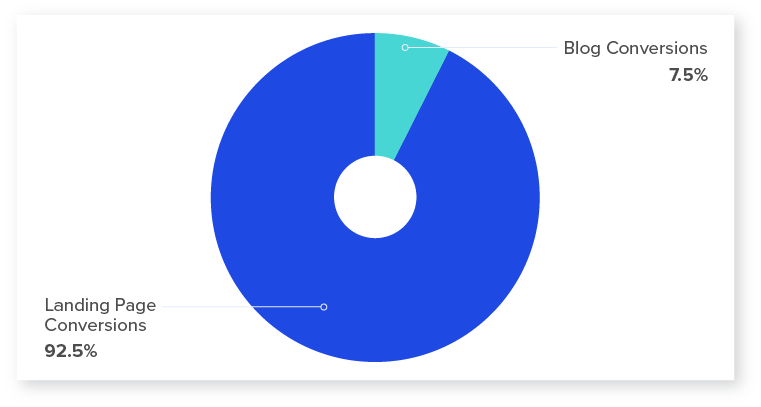
Our blog content occasionally generates a commercially-relevant conversion from time to time, but the overwhelming majority of commercially-relevant conversions come from product or service landing pages.
Informational Keywords for Blog/Resource Content
People use these types of keywords when they are trying to learn something, and as such, they expect to find blog content or other in-depth resources that will do a great job of answering their questions. These types of keyword phrase searches look like:

The majority of these types of searches have no commercial intent (IE they don’t imply that the searcher intends to buy anything at the moment). So you’ll need to calibrate your expectations for what you’ll get out of your blog content.
Think of these keywords as opportunities to answer your audience’s questions with awesome blog content. You want to provide enough relevance so that you sufficiently answer their question(s), and provide enough incentive to subscribe to a newsletter or browser notifications so that you can nurture them until/if the point comes when they want to buy something. By becoming a thought leader or helpful resource for people who are uninterested in a product or service at the moment, you may be top of mind for that consumer when they do decide to pull out their wallet. Essentially, lending to people’s needs can pay off in the long run and may result in new, loyal customers.
So before you get started, make sure you are crystal clear on why you’re doing keyword research, and the results you expect.
Step 2:
Audit What You Have (Optional: For Commercial Landing Page Keyword Research)*
If you answered the question in the previous section with “I’m doing keyword research for my commercial landing pages,” congratulations, you’ve earned yourself an audit! And sorry about that. Nobody gets excited about going through the auditing process because it can be long and detailed work.
*Note: You can do this step for blog posts, too, but often you’re better off just doing a quick check to make sure you haven’t already written for this topic. You can do this simply using Google Search Console/Semrush/Ahrefs/Moz to see if one of your blogs is already ranking for the keyword in question.
But before you research a single keyword, you’ll need a crystal-clear picture of which keywords you’re currently targeting, and how they’re performing. Otherwise, you’re shooting completely blind in the hopes that you’ll make your mark. Think about it: How difficult would it be to aim and throw a dart at a target with your eyes closed? Being aware of what SEO keyword or keyword phrase you’re working with will help you properly line up your shot and hit a bulls-eye.
If you skip this section, let me give you some first-hand insights into what’s going to happen:
- You’ll target keywords you’re already ranking for and waste a bunch of resources creating new content for the same targets.
- You’ll “reoptimize” a perfectly good landing page for a less lucrative keyword.
- You’ll cannibalize the performance of the existing pages.
This will certainly take an entire afternoon, but I promise you’re going to save yourself a ton of work and resources in the long run if you fully audit your landing pages before doing anything else. Think of this as eating your greens before your dessert.
In order to prevent disaster (and possibly even save time!), we are going to look into three main guiding principles that will help you make smarter decisions:
- Are your current target keywords justified?
- How are the pages currently performing?
- Which other (variant) keywords does each page rank for?
Let’s go through the beginning steps of your keyword research process together. Away we go!
Step 1: Audit Your Commercial Pages
Look at all of your commercial landing pages and pull the URLs and their corresponding keyword targets into a spreadsheet. This will give you a clear overview of all the keywords you are targeting, and on which pages they are being targeted. Although this may seem like an extra step in your process, it can be a helpful guide to look back at as you complete your landing page audits.
Make sure you log your data in such a way that you can identify parent/child relationships between pages — I usually just use indentation.
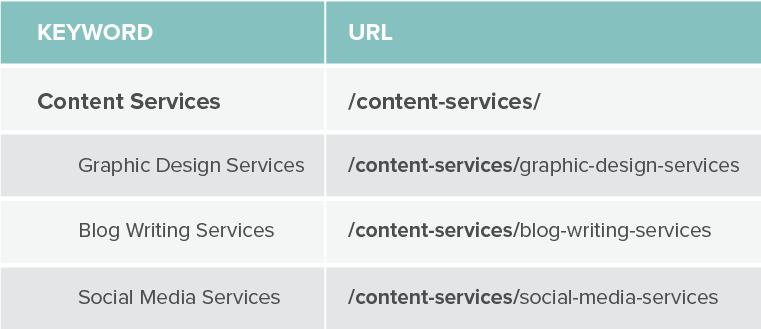
Step 2: Audit the Target Keyword Metrics
Are these even good keywords? You won’t know until you run them through a tool and grab some metrics. Sometimes, the words you believe are being used in a search engine by your target audience aren’t actually the phrases they are looking up. Bulk upload each of your keyword targets into your paid tool of choice and populate the data in your spreadsheet.
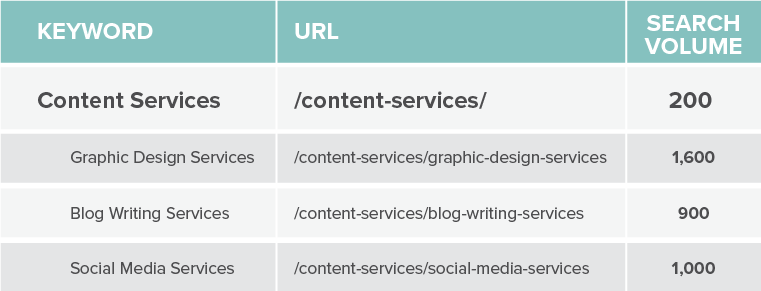
It may look good at first glance, but we need more context to truly know if each target phrase is the right keyword for that corresponding page. We’ll be digging into each individual landing page to completely dissect what’s happening behind the scenes.
Step 3: Audit Your Individual URLs
Oftentimes your pages will rank for variant terms in addition to your target keyword. This situation presents an opportunity to shift your focus to a better keyword, or confirm that you’re already targeting the right keyword. Run each URL through a tool that will tell you all the keywords your URL rank for, and in which positions.
Tools like Moz, Ahrefs, Semrush and Ryte can all do this quickly and easily. Make sure you note your target keywords vs. variant keywords. I’ll do this by indenting the variant keywords underneath the target keyword like so:
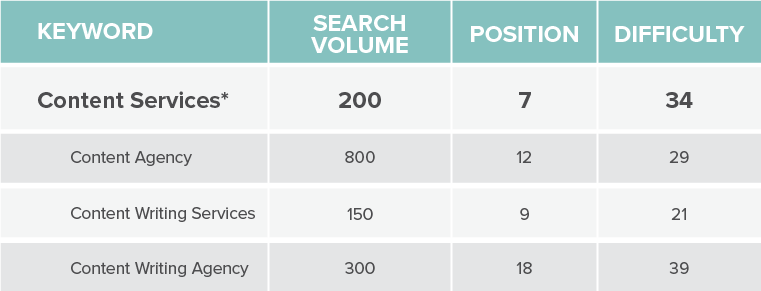
Look at that: We’re not even targeting “Content agency,” yet it ranks in position 12 and has more promising metrics than a lot of our other keywords. This seems like a better target, but I still need more information before I make a decision on what main keyword to target.
Step 4: Dig into Search Console
So far we have only looked at the scraped data our SEO tools have available. These tools do what they can, but they don’t tell a complete story. Google Search Console is going to give you the most reliable, and complete set of data to help you make decisions.
As an example, take a look at the variant keywords GSC found for our homepage:
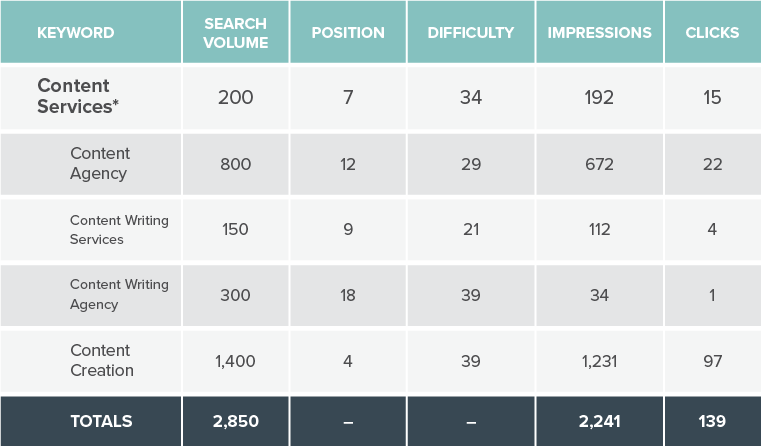
Using GSC will give you clear visibility into all the keywords driving traffic to your page. You’ll see the impressions they generate, their average position, clicks and click-through rate. Inspect each of your landing pages and make note of all pertinent metrics in order for each keyword choice to be truly effective for your website.
This adds an interesting wrinkle: “Content Creation” didn’t show up on our SEO tools’ radars, yet there it is, driving a respectable number of clicks. Furthermore, I ran the keyword through my paid tool and learned that it has the highest search volume out of all the available options.
What to Do With This Information
After you go through this SEO keyword audit, you should have a spreadsheet filled with data for each of your commercial landing pages. This data should tell you:
- Which keywords you’re targeting, and on which pages.
- If the current keyword target has search volume.
- If individual pages rank for variant terms that are better options, or if your first choice is the right keyword.
- If you need to completely rework your strategy for page(s).
You now have all the data you need to start making informed decisions. This entire exercise is done to give you a level set so that you’re not firing blindly at “new” keywords. Based on what you find, you may even be able to minimize the amount of keyword research you have to do in the next steps of the keyword discovery process.
Step 3:
Brainstorm New Keywords to Target
This is where you really get to have fun. Few parts of the keyword research process call for creativity, so for those of you less mathematically inclined, eat your hearts out: New keyword ideation was made for you.
*Note: Blog researchers can jump back in here!
And the best part of the brainstorming step is that there is literally no wrong way to do it. That’s because coming up with new keywords can be completed in any way that makes the most sense to each individual person. Below, I’m going to share some of my favorite techniques, all using free tools.
Tip: Don’t second-guess yourself with any potential keyword idea. There are no bad keywords here. We will rule out weak keywords once we start adding numbers. But until then, have fun with it.
Step 1: Find Somewhere to Jot Down Your Ideas
You need a handy tool to jot down your keyword ideas. I love RapidTable’s tool because it’s simple, and somehow saves my information for months without logging in.
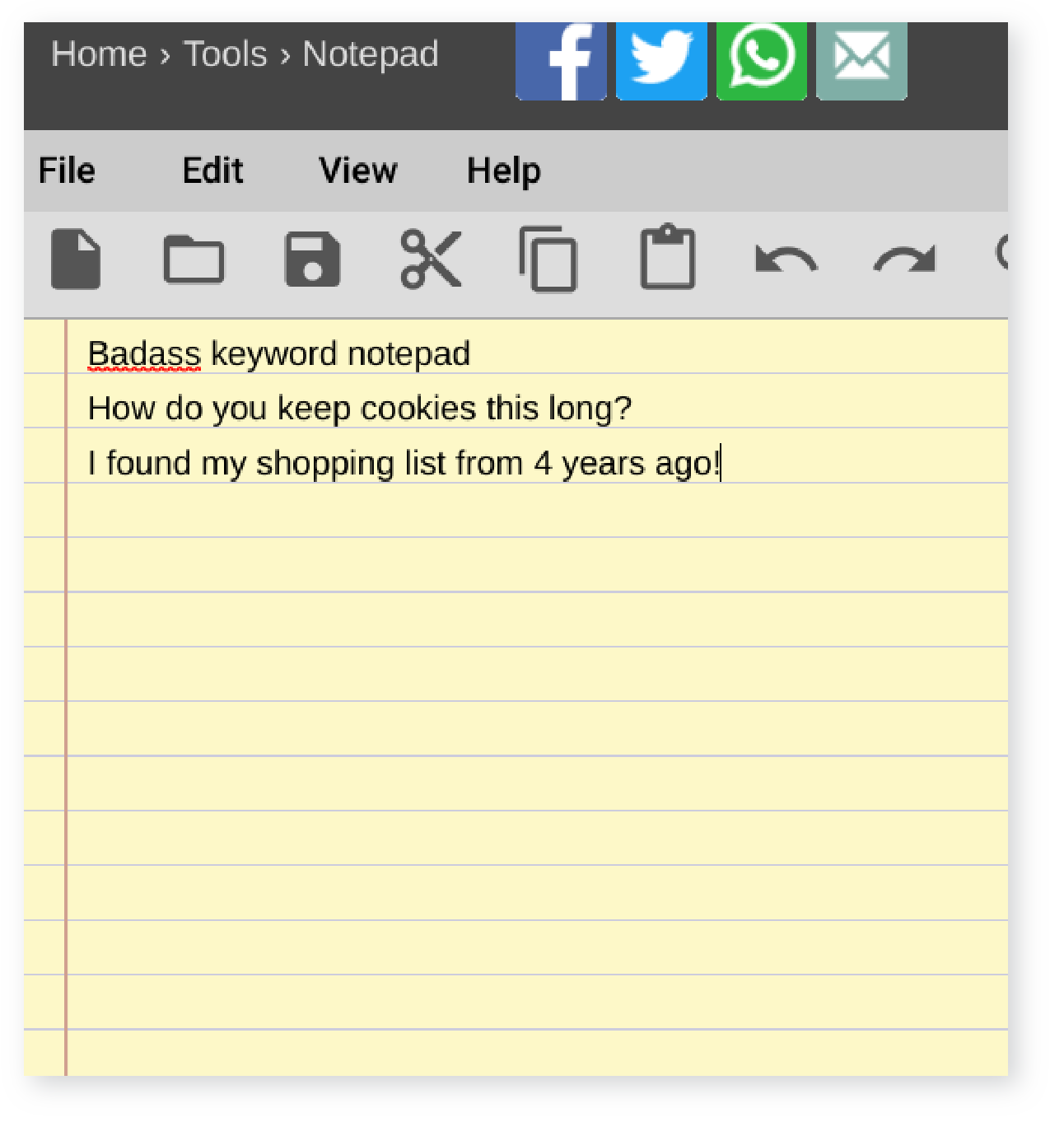
But you can also use a spreadsheet, Google’s notepad, Apple Notes or even a Google Doc. Use whatever you’re most comfortable with, as long as it’s digital and easy to copy or paste large sets of keywords.
Step 2: Choose a General Topic and Jot Down the Keywords You Would Use
You’re going to find that the language you use, the language your company uses and the language your target audience uses is often very different. Before we get ahead of ourselves, we’re going to start by looking at the words that you personally use.
Begin with an idea, called a “seed keyword” from which every other idea will branch out. This is the core idea, or an umbrella phrase that broadly covers the topic at large. Once you have this word written down, jot down every similar keyword you can think of related to that topic. Don’t be shy; record everything that pops into your mind whether you think it’s relevant or not. As you look through these words, you can have a better picture of how you personally use language to describe your company or the services that you offer.
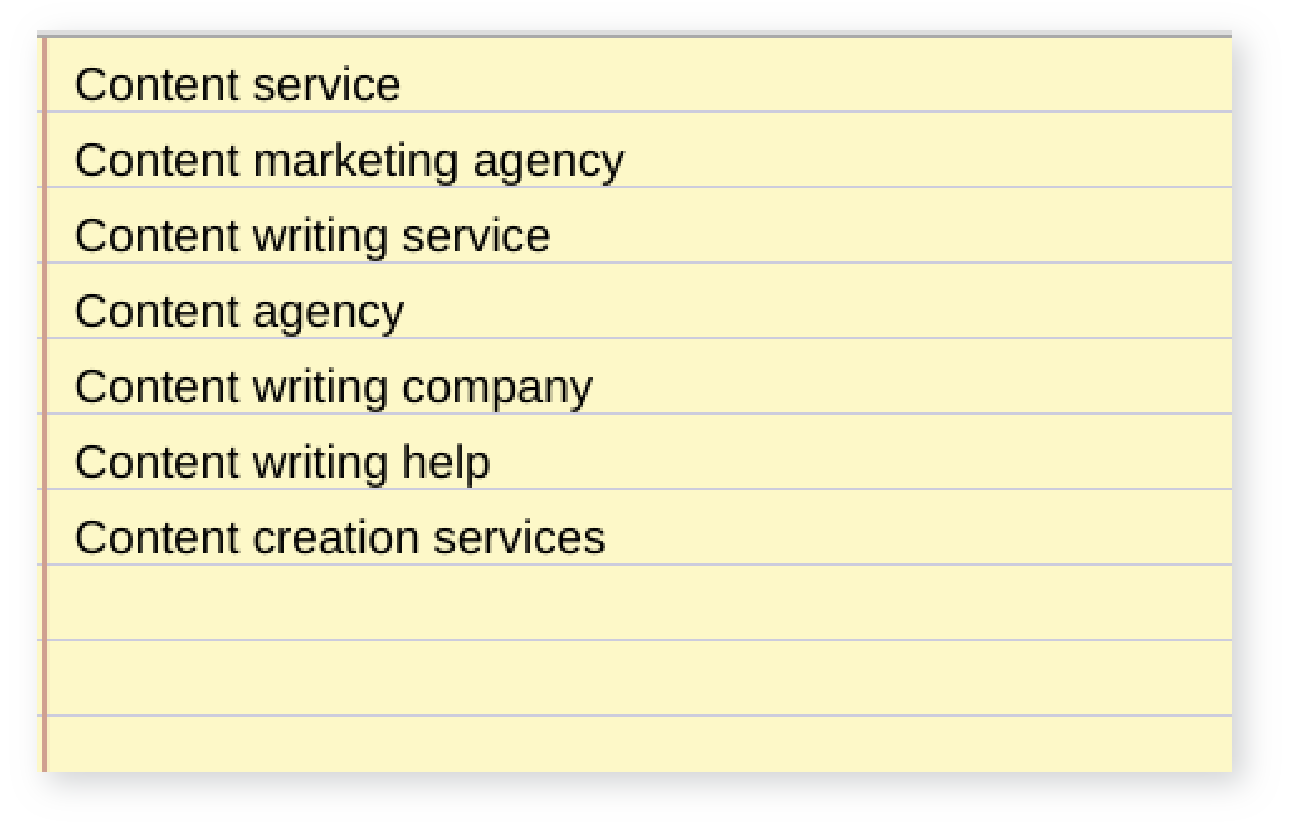
This is a great start, but now we need to get a feel for what your audience would search for.
Step 3: Survey Your Target Audience
You’ll want to get an idea of the type of language and phrases someone who is less ingrained in your industry would use to search for your topic. Oftentimes we are so immersed in our industry jargon that the language we use is way off from what your target audience would use.
This does NOT need to be scientific or drawn out, so don’t overthink this one. Here are a few simple ways you can get some quick feedback:
- Send a Google Form to your newsletter prompting them on your topic: “If you were looking for XYZ type of service, what would you search for?”
- Have a verbal conversation with someone outside of your company who is somewhat familiar with your topic.
- Ask some of your current clients what they searched for to find you, or what they would search if they don’t remember.
Even if you only get a few new keyword or keyword phrase ideas, you’ll still be in good shape because you can build on them.
Step 4: Do Some Competitive Research
Pull up your top three competitors in separate browser tabs and start navigating through their content and language. If you’re doing commercial keyword research, check the title tags of the pages in their main navigation. The keywords they’re targeting are (or at least should be) used in their title tags.
For blog topic research, jump into their blog feed and search for related topics. (Or anything that catches your eye — you may find some surprisingly great ideas.)
If your competitors have already done a significant amount of keyword research, you might as well use that already-completed information to your advantage.
Step 5: Use Free Tools to Help With Ideation
There are more keyword research tools out there than I can count, and their quality and usefulness vary wildly. So for the sake of keeping this guide manageable, I’m going to limit this list to only the free tools I use most frequently for ideation only.
Google Keyword Planner Tool
Google Keyword Planner is a terrible resource for assessing accurate search volume, but it’s still a great tool for ideating and adding to your list.
You’ll need to create a Google Ads account, and it’s likely going to funnel you through a process where you’ll need to pretend that you’re going to create a PPC campaign. But don’t worry, you can go through the whole charade without paying a cent and still use the tool to your advantage.
Click on “Discover new keywords,” then add up to 10 seed keywords to get recommendations.
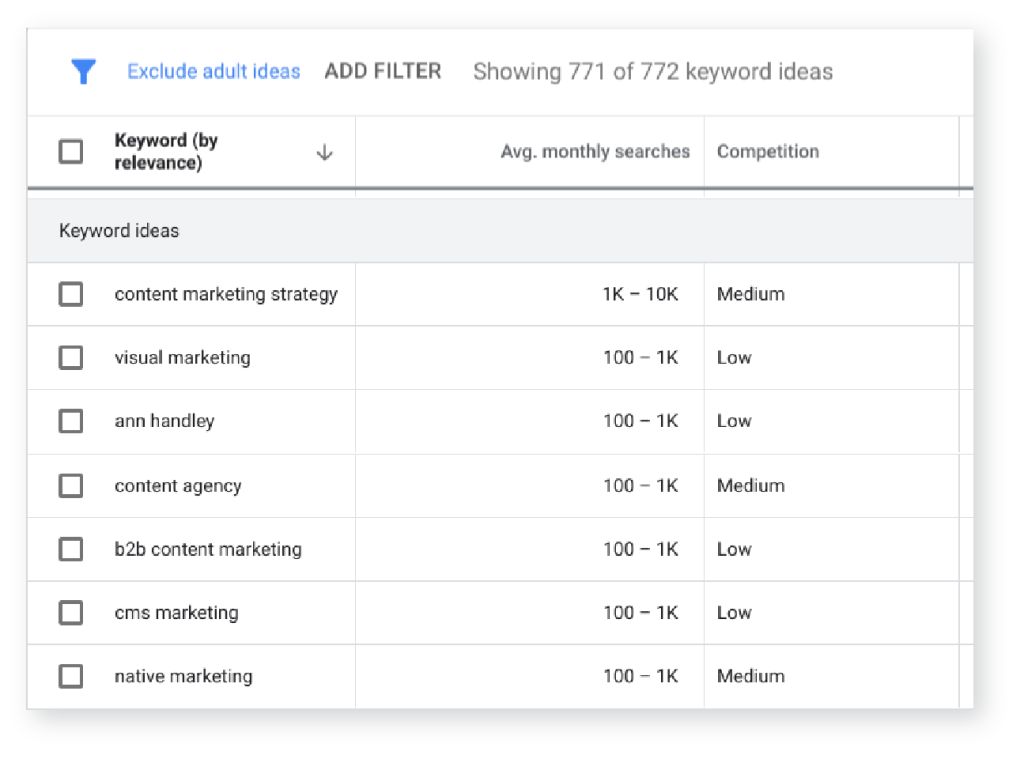
KPT will then populate a (hopefully) large list below your seed keywords that you can add to a list and export. Export the .CSV file, then copy and paste the keywords into your notepad. We’ll be adding all ideas from every tool into this one master list. And don’t worry about duplicates. Our tools will take care of that later.
Soovle
Soovle is a fun tool that will autocomplete a seed phrase across a number of search engine options including YouTube, Amazon, Bing, Yahoo! and Google.
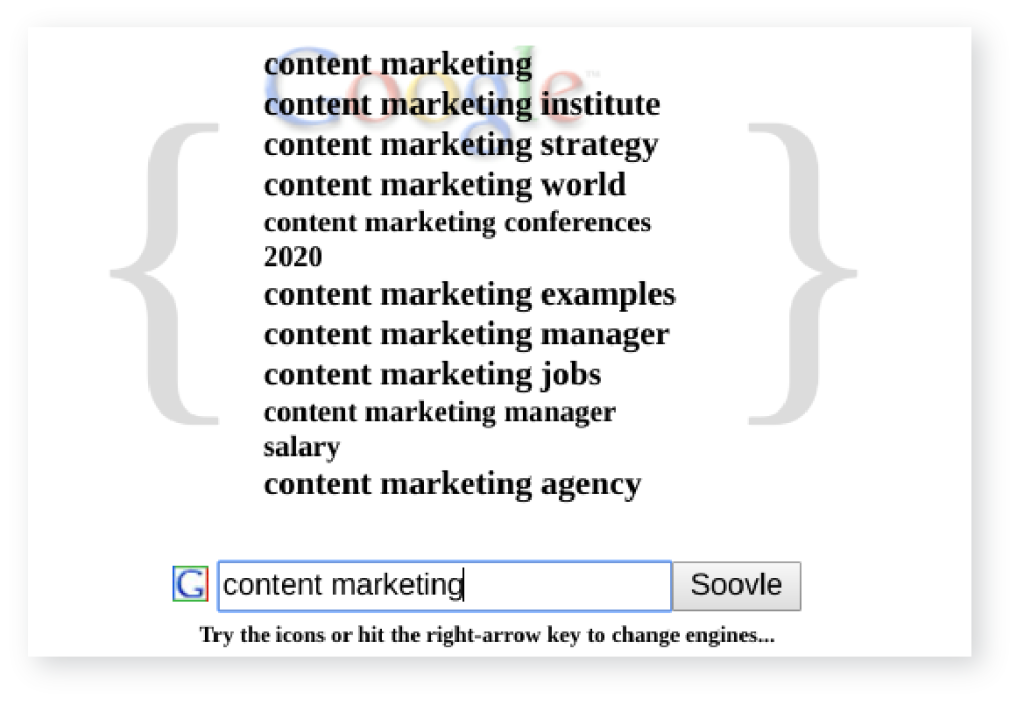
I rarely have use for non-Google results, but occasionally ideas pop up in the other search engines that I can use. Try a couple of your seed keywords and see if anything interesting populates that you want to add to your list. You won’t get massive lists of keywords from this tool, but it can certainly spark ideas you hadn’t considered before.
Answer the Public
Answer the Public is similar to Soovle in the way it uses autocomplete data to give you insight into highly related searches to your topic. Imagine ATP as a supercharged version of Soovle, with the added ability to export a .CSV for all the keyword ideas it generates, which can number in the hundreds.
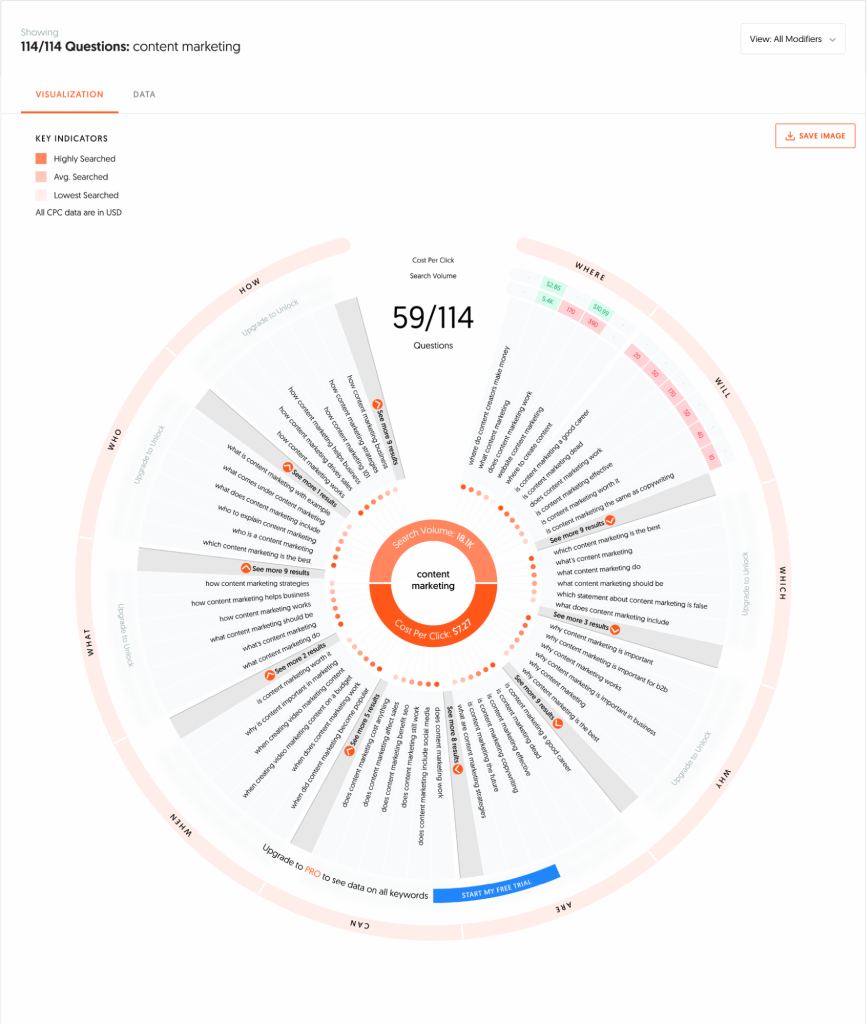
Entering “Content marketing” immediately gave me 201 ideas that I can quickly export into a .CSV and add to my list. Pretty handy!
*Choose your seed topics wisely because ATP only allows you to do a few free searches per day.
Keyword Sheeter
This tool was previously named “Keyword Sh*tter,” likely due to its ability to “output” thousands of keyword ideas from nothing more than a single root keyword. On top of that, it’s really fast. Within a few seconds of entering “Content marketing” in the tool, Keyword Sheeter generated over 100 different search term ideas.
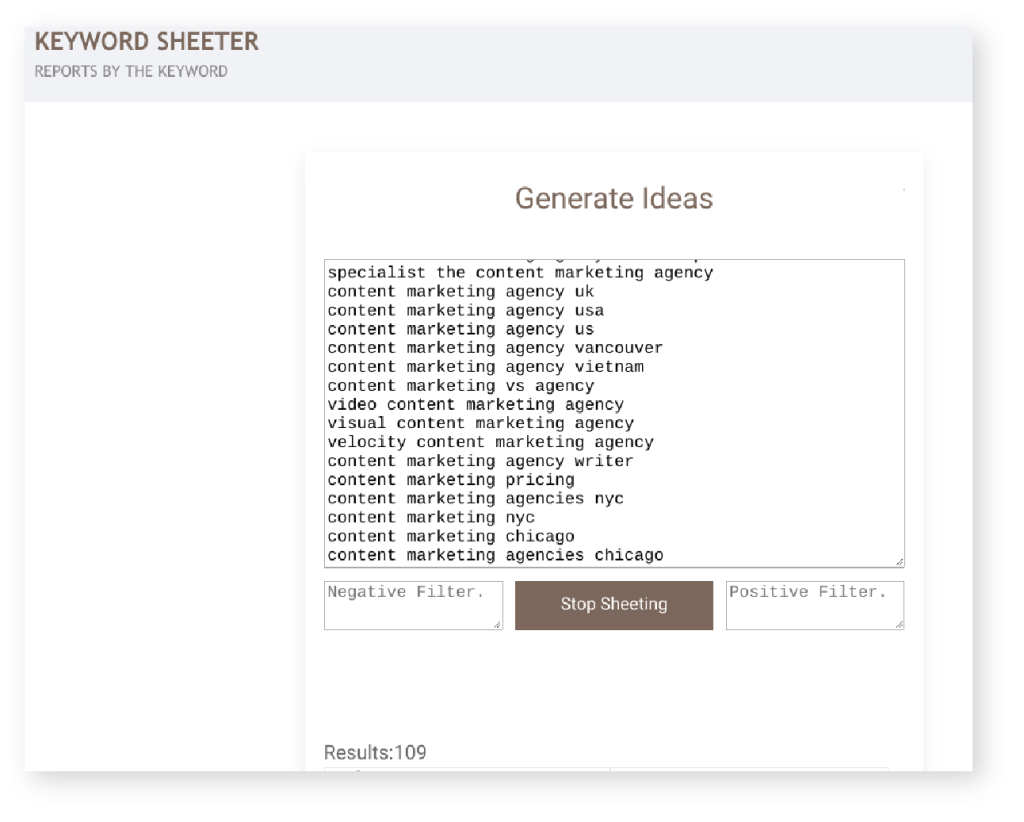
The free version of this tool allows you to export the full .CSV file, while the paid version will add search volume and CPC figures. We are going to be using search volume data from other tools, so we’ll just take the free ideas, thank you.
Tip: Keyword Sheeter could potentially be the only ideation tool you use if you’re in a time crunch. The results won’t be as strong, and you will get a lot of garbage keywords, but you’ll get a lot of good keywords as well, and very quickly.
Ubersuggest
If Ubersuggest allowed you to bulk upload keywords and export search volume and keyword difficulty numbers, it would be a pretty complete (and formidable) keyword research tool. But it can’t, so we’ll have to settle for its very capable ideation abilities. Ubersuggest has a number of features that can help you get ideas:
“Domain Overview” shows you the keywords your competitors are ranking for.
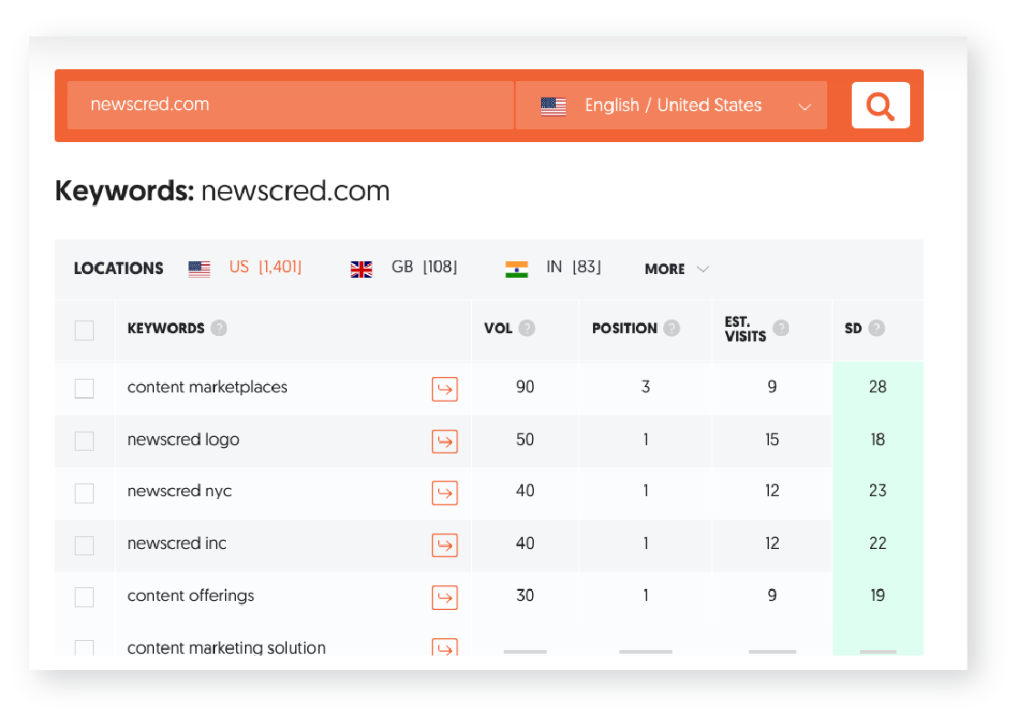
“Keyword Ideas” will give you a list of keywords similar to the seed keyword you entered. This feature comes with the added bonus of being able to filter by search volume, search difficulty, positive and negative filters, and PPC metrics.
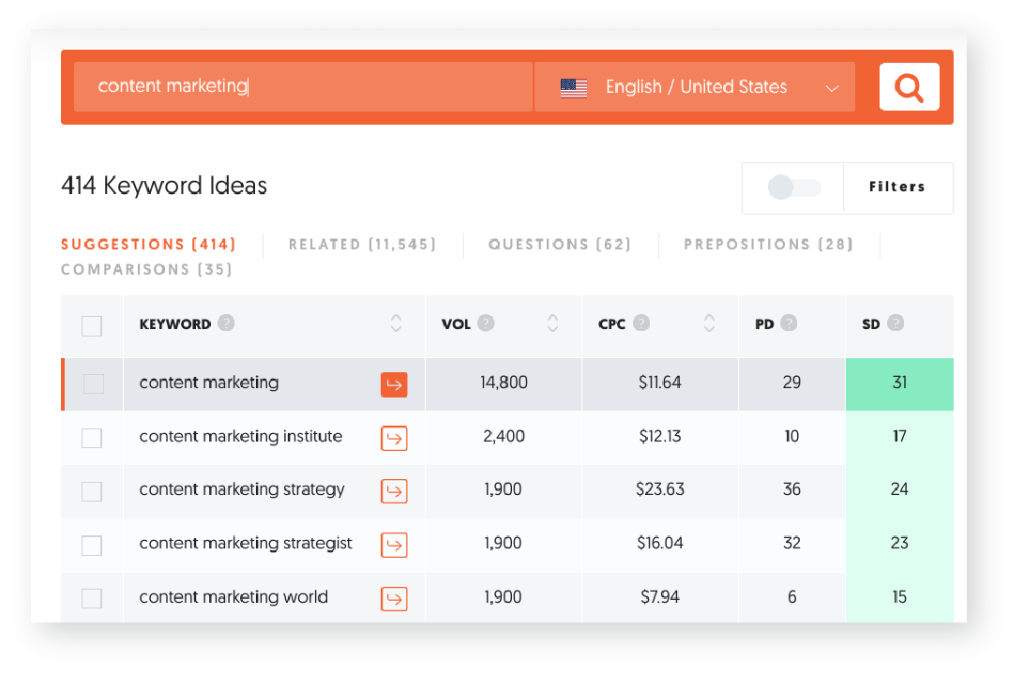
“Content Ideas” is a bit like a lite version of BuzzSumo, giving you a list of top blog-type content that has been written, sortable by total Facebook or Pinterest shares.
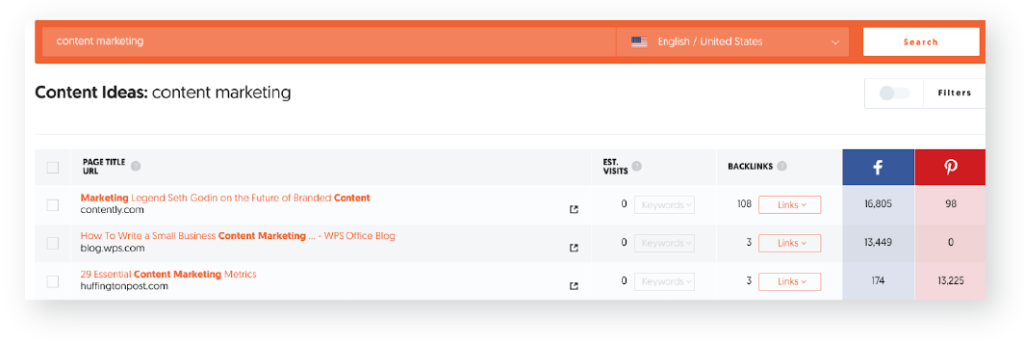
For a free tool, Ubersuggest is pretty comprehensive. Play around in here and see if you can squeeze out a few more ideas.
Ideation Conclusion
Having scraped the depths of the entire internet for a topic, your master list should be enormous at this point. Depending on your topic, you could have up to a thousand keywords or more.
Tip: As a rule of thumb, you don’t need to have a target number of keywords in this list because it will vary greatly depending on your topic. But, looking at your list you should subjectively feel that you’ve got a healthy variation of phrases. If it feels a bit thin, it probably is.
Get ready to do math, because now we are going to dive headfirst into numbers.
Step 4:
Gather and Understand Your Keyword Metrics
As much as the previous step was a purely creative exercise, the next step will be 100% data-driven. We’re going to use metrics from a variety of sources to determine the viability of each of our keywords so that we can make the most informed decisions possible.
We’ll start with some conceptual ideas, then move into practical usage with tools and spreadsheets. And don’t worry, even the least mathematically inclined of you will be able to understand this.
Search Volume: The Average Number of Times a Keyword Is Searched per Month
Any paid keyword research tool will give you an estimated monthly search volume for the keywords you want to evaluate. What we’re trying to do here is find keywords that have sufficient search volume to justify investment in creating new pages, or re-targeting old pages.
For instance, it wouldn’t be wise to write a 2,000-word blog post that targets a keyword that is only searched 10 times per month. In other words, it’s not a good use of resources to target a topic that is searched so infrequently.
When considering the monthly search volume of keywords, keep in mind that you will not automatically be getting all of those clicks. Of the monthly search volume for your keyword, your share of clicks will be determined mostly by your ranking position.
Here’s a helpful graph that illustrates how your position determines your click-through rate:
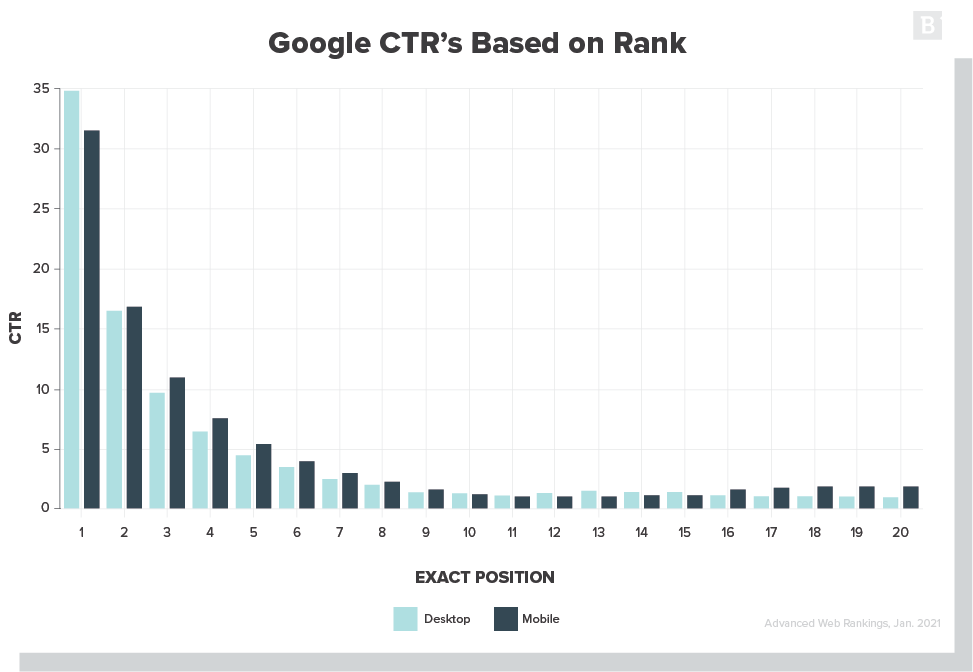
Your click-through rate drops exponentially from position 1 to 5, then flattens out into the land of irrelevance from positions 6+. So, in the best-case scenario (you rank in position 1), you’ll take about 32.5% of all clicks.
You need to keep that in mind when asking questions such as, “Is a search volume of 50 enough?” Do some simple math and calculate best- and worst-case scenarios. In the best-case scenario, you’ll get 16 clicks per month in position 1. If you land somewhere on Page 2, you may not get any clicks. The important thing to remember is that, if you’re going to intentionally create new content for your landing page, you want it to be helpful for the audience, worth your time to write and bring you a return on your investment.
Using Tools to Gather Search Volume at Scale
We’re going to be using a number of different keyword research tools to get an estimate of the monthly search volume of each of our keywords in the list we’ve been building.
We also need to emphasize the word “estimate,” because each tool is truly guessing what that actual number is, so it’s vital that there is that understanding before implementing any new keywords.
And that number will vary wildly from tool to tool. For instance, take a look at the estimated search volume for “content marketing services” across a few tools:
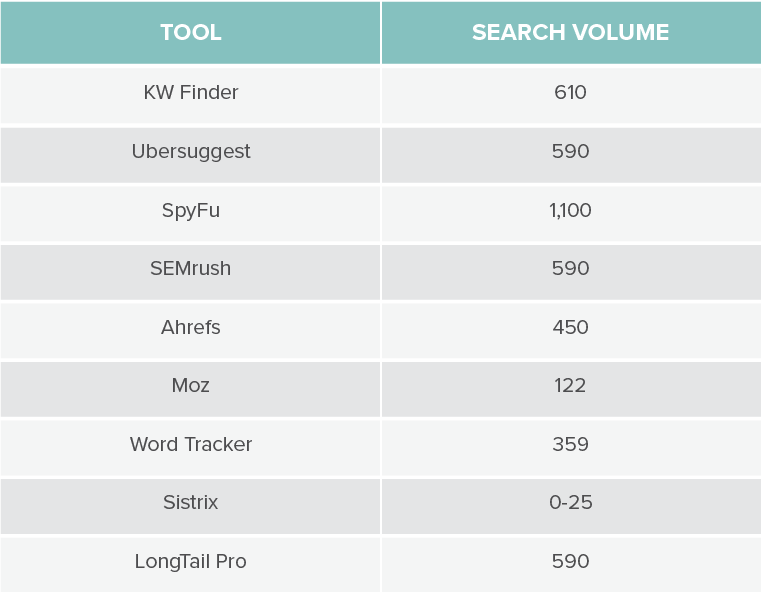
Given the wide range of results (from zero to 1,100 searches per month), it’s going to be important for us to use the “search volume” metric as an estimate, not as gospel.
As long as we do that, we’re golden. In other words, it’s not about finding the exact search volume for a keyword; it’s about getting a general idea of interest and acting on the information available.
I prefer to use a combination of tools when gathering this metric. This helps me identify keywords that have more reliable search-volume estimates and I’m more likely to make an educated decision on a keyword that has a search volume with little variation between tools, than one that has enormous variation.
Looking at the chart above, if you had used only one tool, say SpyFu, you would likely overshoot the keyword’s true potential by a substantial margin. So if you’re looking for a high degree of accuracy, using more tools will give you more confidence in your choices.
Keyword Difficulty: The Level of Organic Competition You’ll Be Up Against
I’m going to argue that this is the most overlooked and crucial step that most SEOs fail to do, and for reasons I can’t quite understand. When evaluating your keyword list, you need to know whether or not you stand a realistic chance of ranking for that keyword. Without that information, you’re unsure if the work you put in to create that organic content is actually worth it.
Most reputable keyword research tools have some version of keyword difficulty as part of their keyword metric offerings, each with unique formulas and scales and varying degrees of accuracy.
Here are a few examples of keyword difficulty scores from Ahrefs, Moz and Ubersuggest:
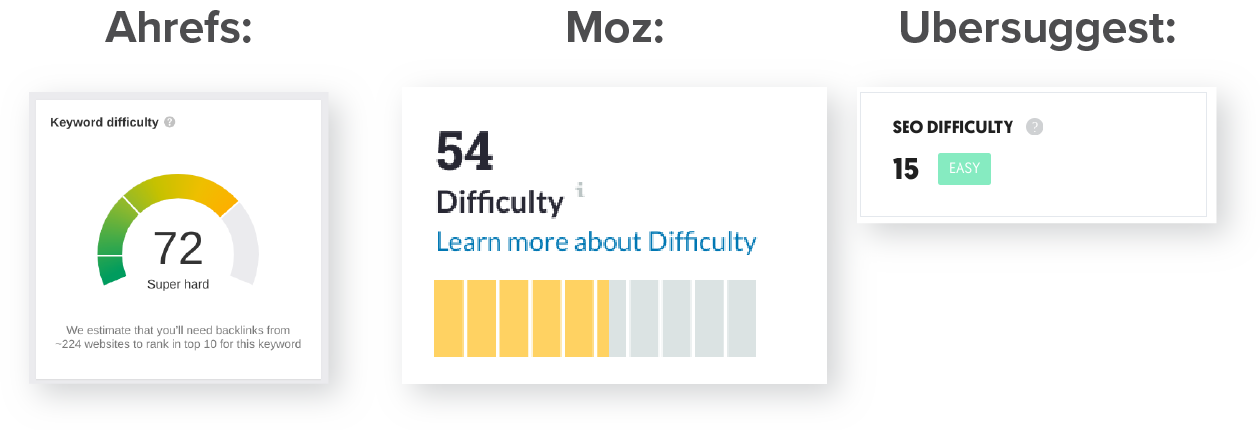
So What Are These Scores Telling You?
Simply put, keyword difficulty measures the average strength of the pages and their domains that rank on Page 1 of results for the keyword in question.
Moz focuses primarily on a combination of Page Authority and Domain Authority to determine difficulty scores.
- Page Authority evaluates the strength of an individual page, calculated by dozens of factors. It’s useful for comparison purposes: A page with a higher Page Authority is more likely to rank for a target keyword than a page with a lower Page Authority.
- Domain Authority evaluates the overall strength of an entire website, also calculated by dozens of factors. A site with a higher Domain Authority than another is considered relatively more authoritative and trustworthy (and more likely to rank for target keywords) than the other.
It’s important to note that these are relative metrics, meaning there is no “good” or “bad” Page Authority or Domain Authority. You may be tempted to think a Domain Authority of 84 is very good, but what if your competitor has a Domain Authority of 96? These are meant to be relative metrics so that you get a clearer understanding of which competitor has the strongest ranking potential.
Using MozBar, you can see the PA and DA of each search result:
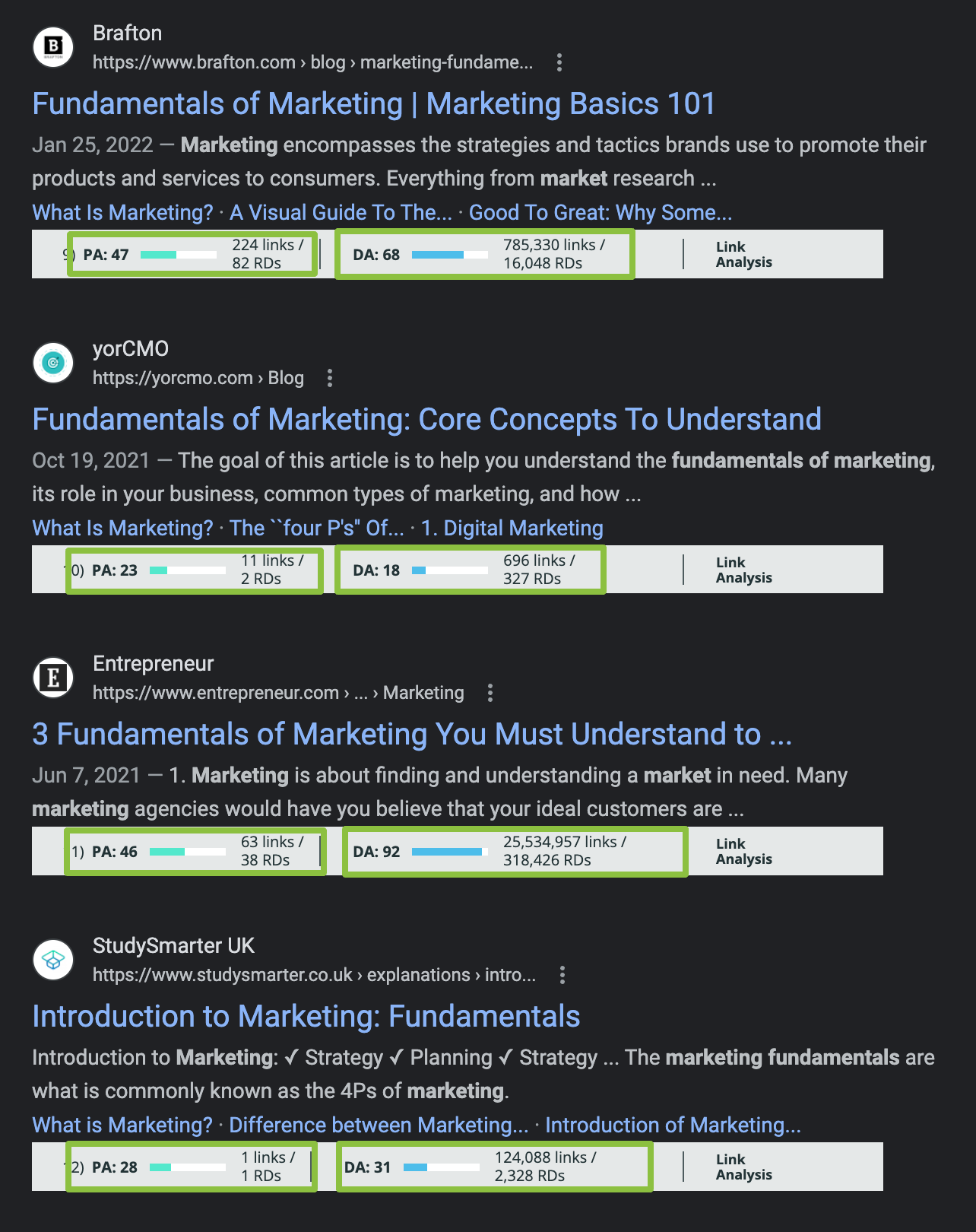
Moz looks through the first page of results for the keyword you’re targeting and assigns a keyword difficulty score based mostly on the strength of the pages (PA) and domains (DA) that currently own spots on Page 1. This should help you understand if the competition is relatively stronger, weaker or the same as your site.
For example, if we’re trying to rank for the keyword “Inbound marketing,” we see that the keyword difficulty score is 60.
And the competitors look like this:
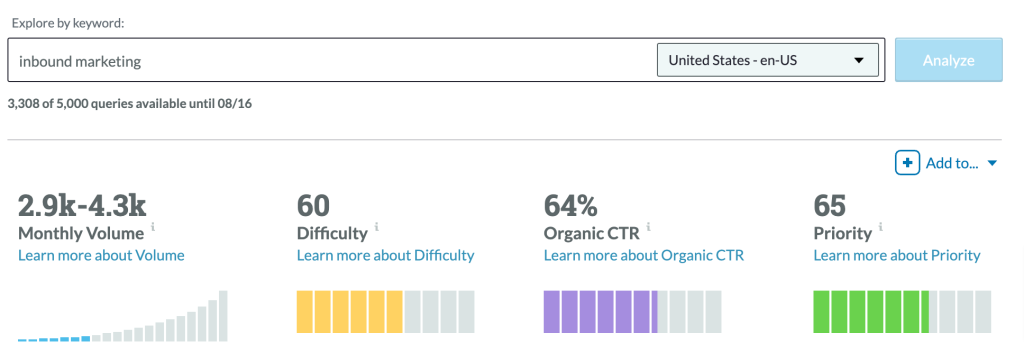
And the competitors look like this:
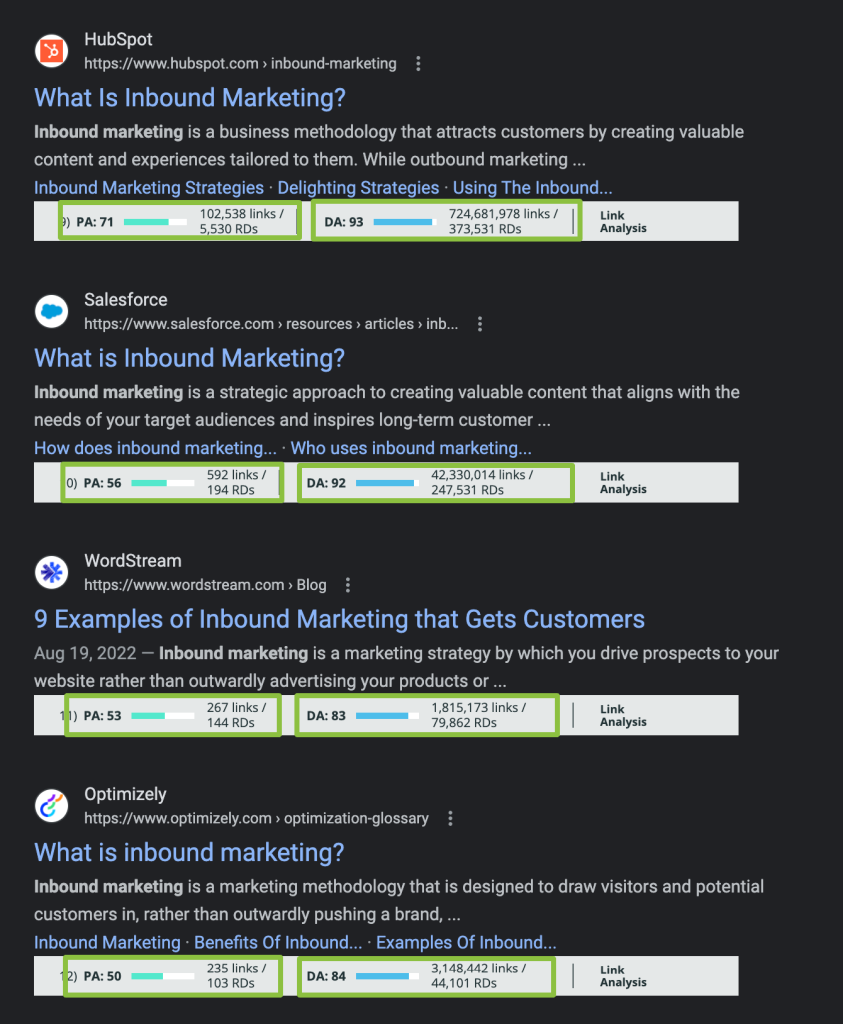
The average Domain Authority on Page 1 is 86. Our Domain Authority is 68. This makes us a definite underdog, punching way above our weight class. This is not likely a keyword I would target. Generally, we can compete for keywords up to a difficulty score of around 45. I’ll opt to pass on this keyword.
Fortunately, with most keyword research tools, you can batch upload lots of keywords and export their monthly search volumes and difficulty scores. This makes it very easy to sort through large lists of keywords and identify those with good combinations of search volume and difficulty scores.

You can easily export this data and manipulate it in a spreadsheet using conditional formatting and custom formulas to find the right keyword options you should target.
SERP Crowding
Let’s take stock: So far you have narrowed your list down to a set of keywords with an acceptable search volume that you can realistically rank for on Page 1 of results.
Are we done? No.
What happens if you rank in the third position for a keyword, but the page is extremely crowded with PPC, news, featured snippets and images? Your organic result gets ignored, that’s what.
As a searcher, you know exactly what this looks like. And this problem is getting increasingly pervasive. We have data that tells us over half of all searches result in no clicks:
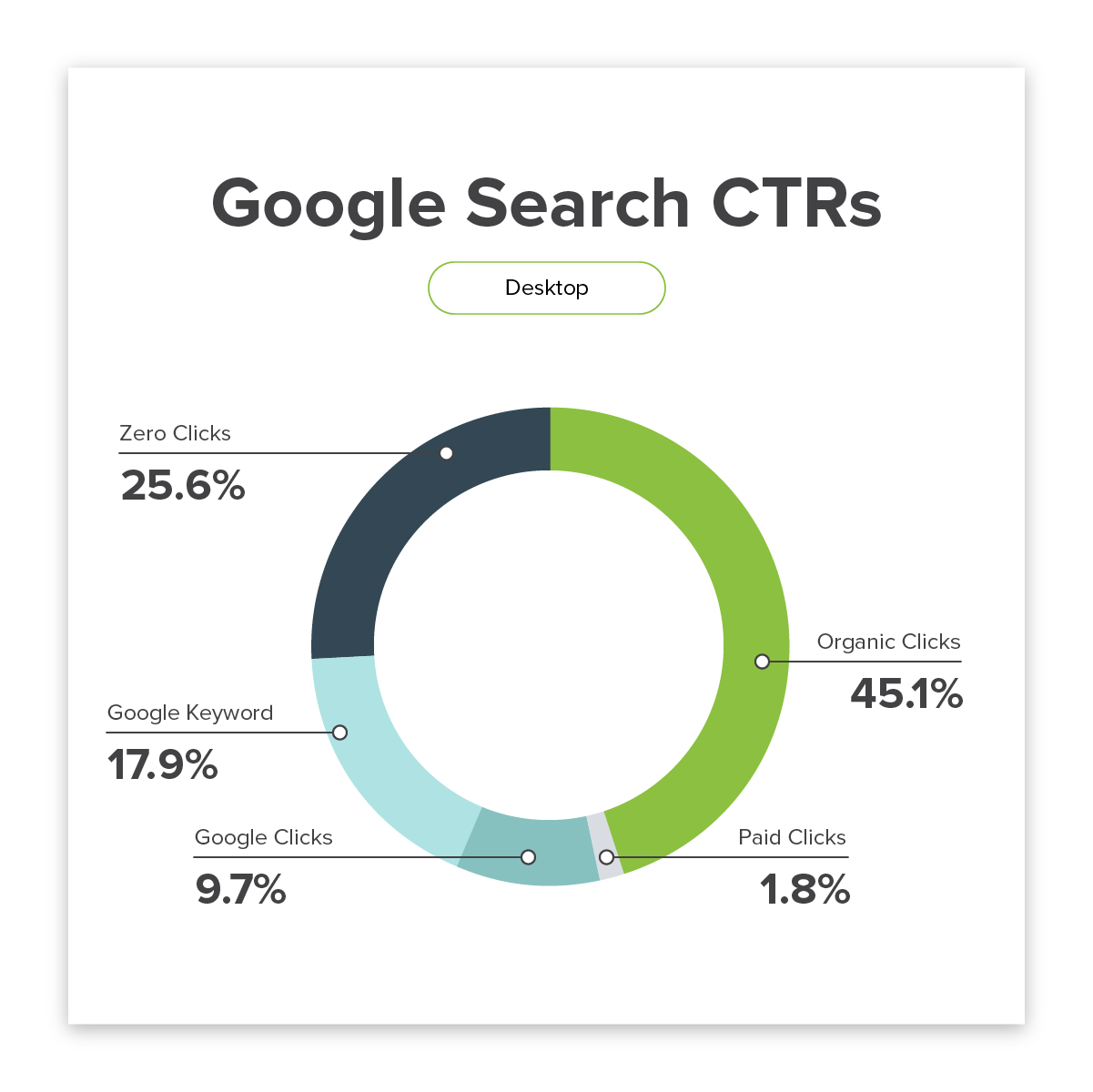
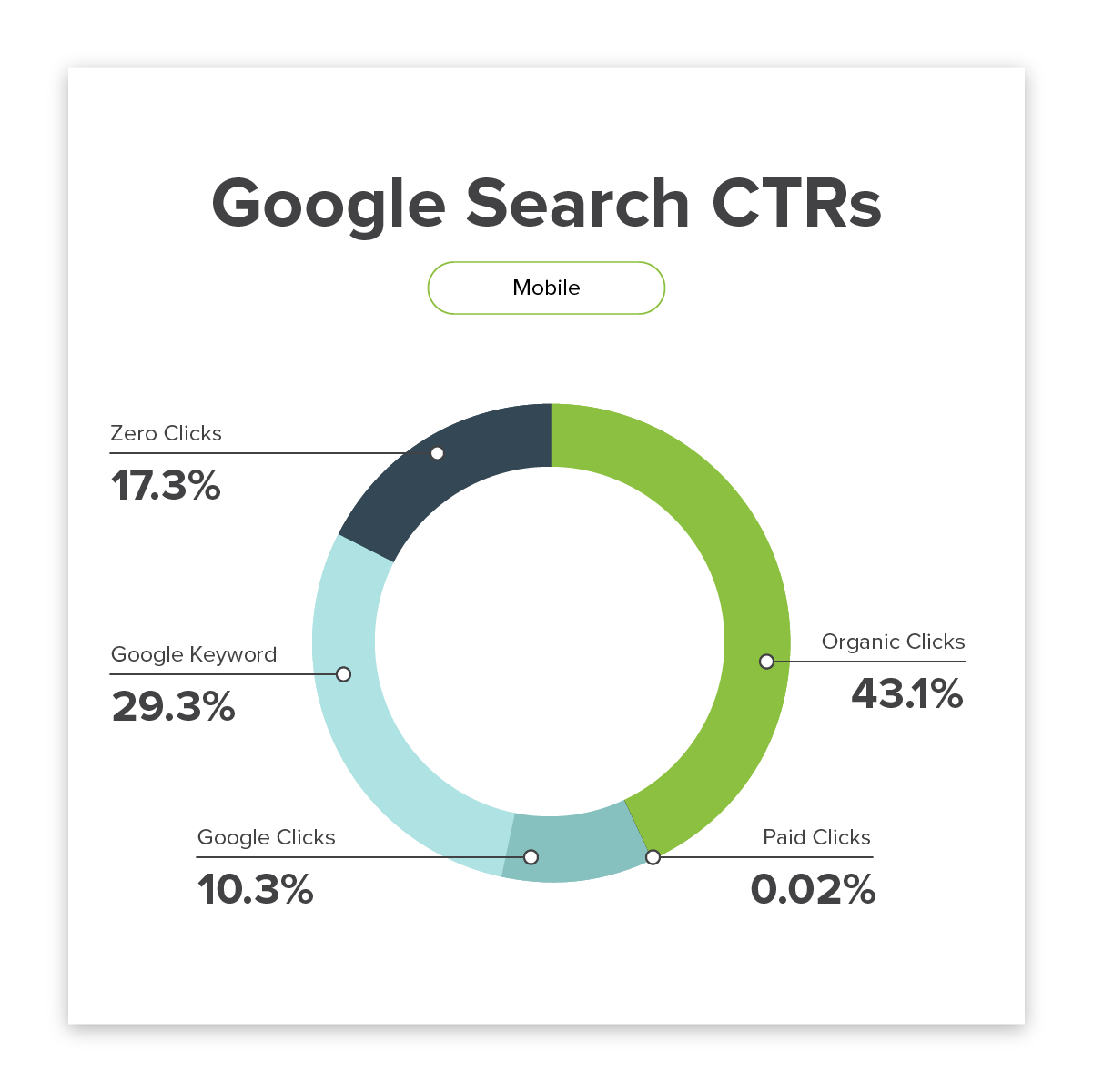
This rapid decline is primarily due to Google pulling content from publishers’ websites and “borrowing” it for their search engine results pages (SERPs). Looking at the trendline below, we can see that it’s becoming increasingly difficult for SEOs and content marketers to win clicks from search:
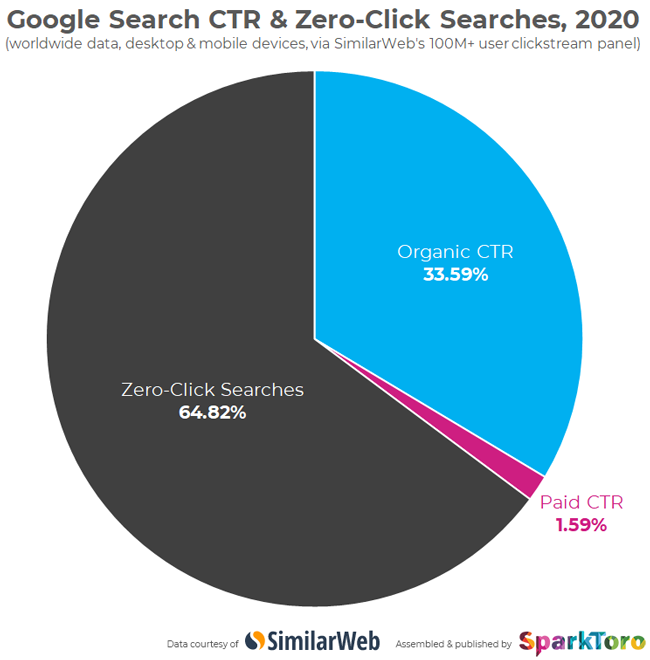
More clicks are also going to Google properties and Google Ads each year.
So what does that mean for you? It means that even if you make it to Page 1, your likelihood of getting a click continues to decline. That fact is more obvious in the instances where SERPs are littered with non-organic results.
Take a look at this SERP:

Good luck getting an organic click on that results page! We’ve got shopping, ads, a featured snippet, people also ask, videos and more ads.
Fortunately, there are a few tools out there that can help you calculate how much these distractions will influence a click. Moz uses an “Organic CTR” scale from 1-100% that estimates the percentage of clicks available compared to traditional organic results. In other words, lower scores = lots of distractions and bad for organic results. Higher scores = fewer distractions and better for organic results.
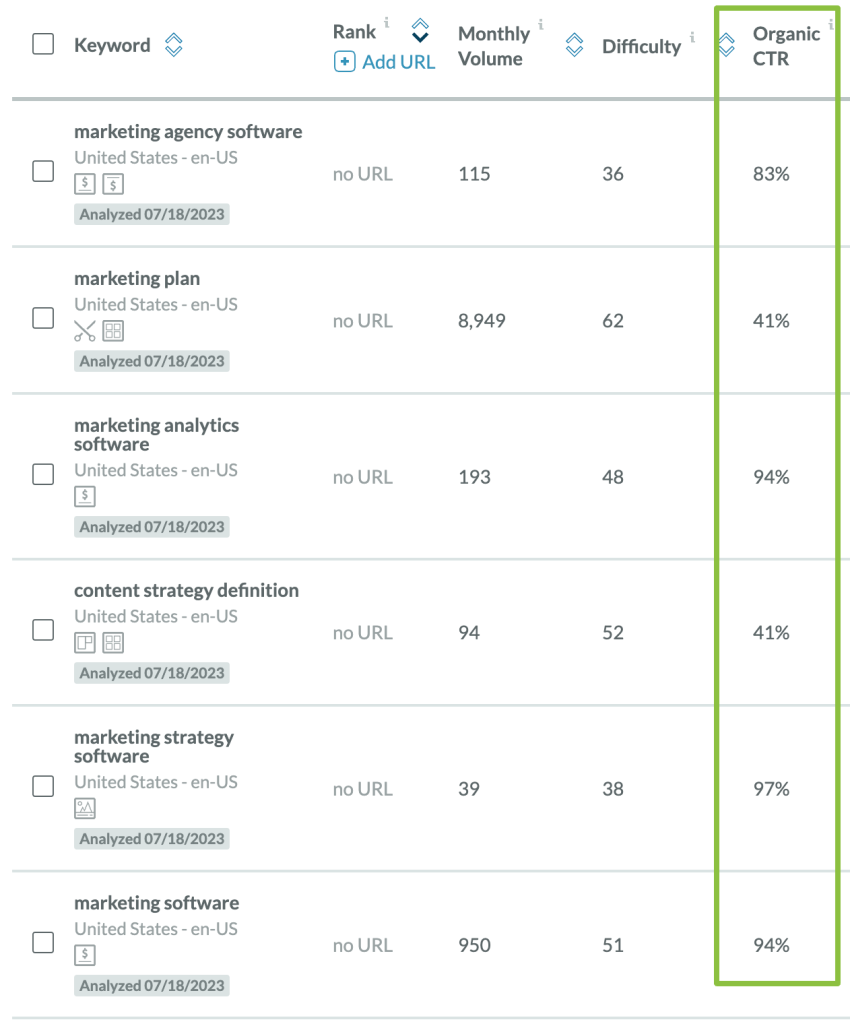
Ahrefs has a very helpful metric that indirectly addresses this issue, called “clicks per search,” or “CPS.” It’s calculated by dividing the monthly search volume by the number of actual clicks that happen after a search.
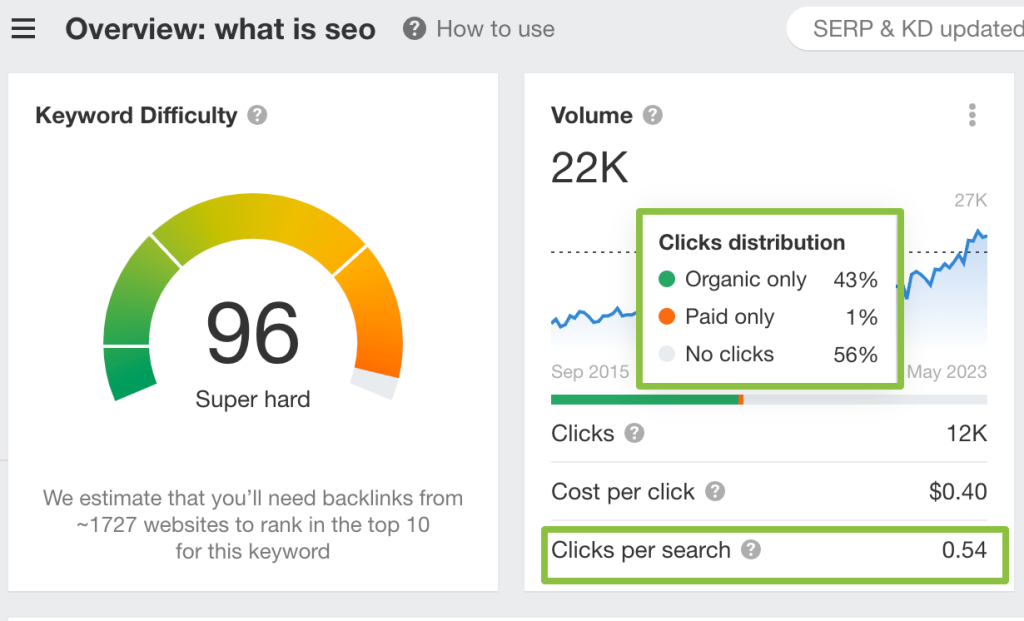
You could argue that keywords with a clicks-per-search score lower than 1.0 are scoring that way because of the information Google pulls directly onto the SERP. With answers presented right on the page, searchers have very little reason to click through to a website to search for the information they need.
This is important information to use in your analysis when evaluating keyword opportunities.
Now that we understand the types of metrics we are going to be working with, we need to choose a paid keyword research tool.
Why paid?
Paid tools often give you the benefit of amassing a large amount of SEO keyword data at scale (and you can’t get the data we need from free tools). This helps cut down on the time it will take you to evaluate your (likely very large) list of potential keywords.
Step 5:
Select a Paid Keyword Research Tool
I’d love to tell you that you can perform awesome keyword research for free, but unfortunately the metrics we need to make good decisions all cost money. But fortunately, I have plenty of experience with paid tools and can make some recommendations. Any of these resources may benefit your business and bring better results for your website traffic.
This list is completely subjective and based solely on my experience of experimenting with many (so many!) keyword research tools over the years.
I generally recommend tools based on the following categories:
- Accuracy: How good the tool is at predicting rankability.
- Ideation capabilities: How easy it is to build large lists of potential keyword targets..
- Batch uploading capabilities: Can the tool import data as easily as it can export data?
- Keyword match rate: Does this tool have search data for the keywords in my list?
- SERP analysis capabilities: Is there a quick and easy way to view real-time SERP data for a given keyword without having to check it manually.
- Perceived value: How well this tool accomplishes parts 1-5 of this list.
- Overall user experience: Does it look nice? Is it intuitive and easy to use? Does it work flawlessly or crash all of the time?
With that out of the way, it’s time to geek out about paid keyword research tools. Onward:
Ahrefs Keywords Explorer – $99 minimum monthly plan
Ahrefs is what I would consider a complete keyword research tool. It offers a ton of keyword suggestions to add to your ideation process. Additionally, it has a few unique features like clicks per search, return rate and a notably accurate keyword difficulty scoring formula for lower difficulty keywords. It also features an estimated number of backlinks and root domains needed to compete on Page 1 for a given keyword.
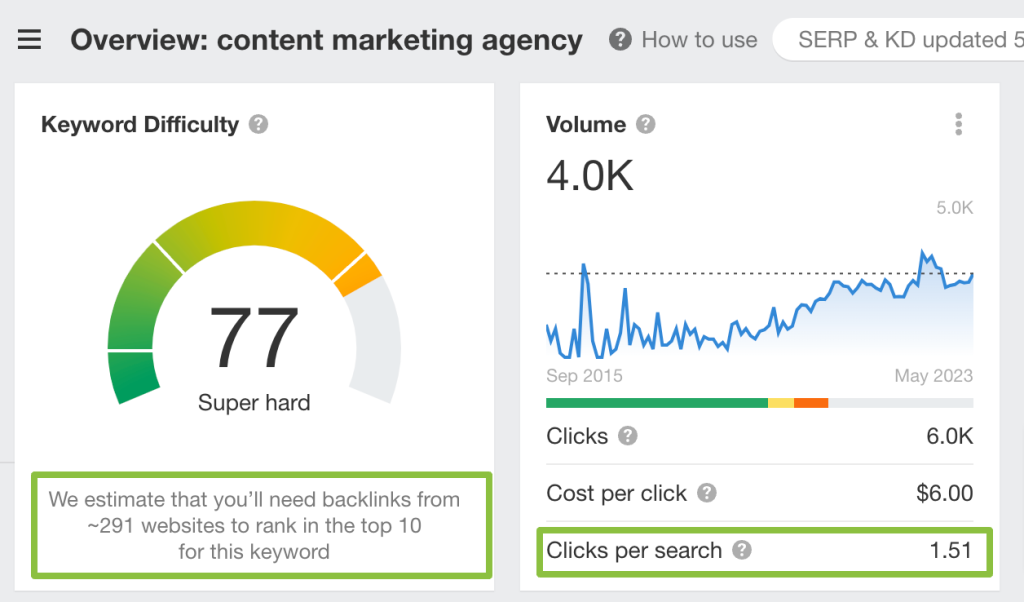
I’m also a big fan of the estimated traffic metric in the SERP overview section, which gives you a realistic look at what kind of overall search traffic you can expect if you target and rank for a particular topic. This is calculated by estimating traffic from the total variant keywords a specific URL ranks for, along with the ranking position for each of those keywords, search volume and estimated CTR.
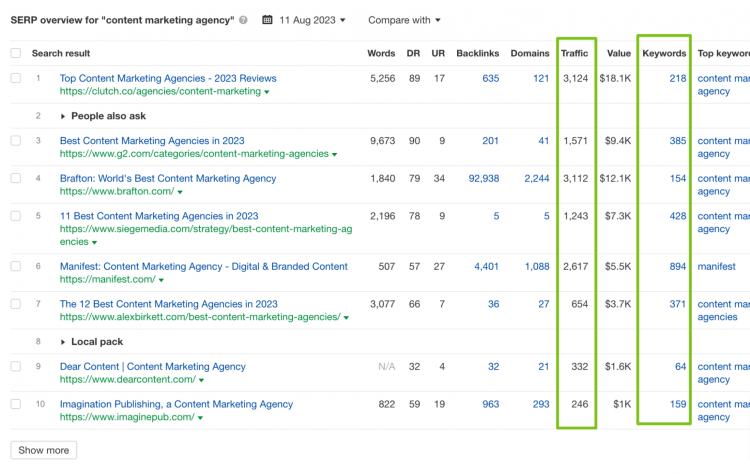
This is a much more realistic way to project traffic for a keyword topic. As a matter of fact, I backtested this analysis and found this method to be 80-85% accurate in predicting actual organic traffic. Removing outliers got me above 90%. Pretty remarkable stuff for projecting traffic without writing a single word (we’ll talk about this in more detail later).
Pros
- Strong ideation and list-building capabilities.
- Batch keyword uploads.
- Unique features like Clicks per Search, Return Rate, Clicked and Not Clicked.
- Strong rankability accuracy for keywords with low difficulty scores.
- Good UX.
- High match rate (many keywords in database).
- Awesome SERP analysis features with high traffic projection accuracy.
Cons
- Keywords without search volume won’t populate in lists with “zeros” — they just don’t show up, making it difficult to cross-reference when aggregating data from multiple tools.
- High price point puts them out of range for limited-budget content creators and SEOs.
Moz Keyword Explorer – $99 minimum monthly plan
Moz has a special place in my heart. It was the first keyword research tool I started with nearly a decade ago. It remains a mainstay and trusted resource in my repertoire.
Moz was one of the first tools to provide organic keyword difficulty scores, giving them a leg up against the competition. In terms of accuracy, user experience and value, Moz is a really nice tool for just about any level of SEO. Furthermore, their subscription comes with MozBar, which allows you to inspect search engine results pages (SERPs) on the fly and gives you an incredible read into the competitive landscape. There is no substitute for manually inspecting SERPs for difficulty.
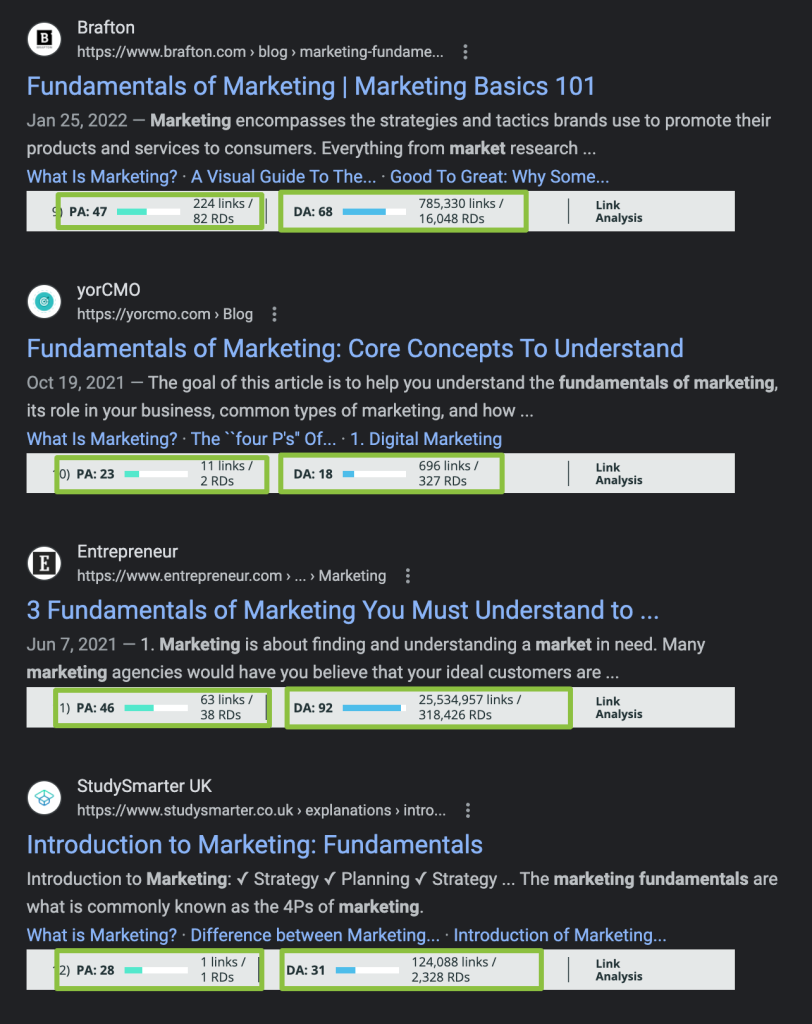
Moz also has a unique feature that helps you determine keyword priority by combining search volume, difficulty, SERP crowding and a subjective relevance score (My Score AKA is this keyword actually relevant to my business?), making it easy to sort through massive quantities of keywords in one go.
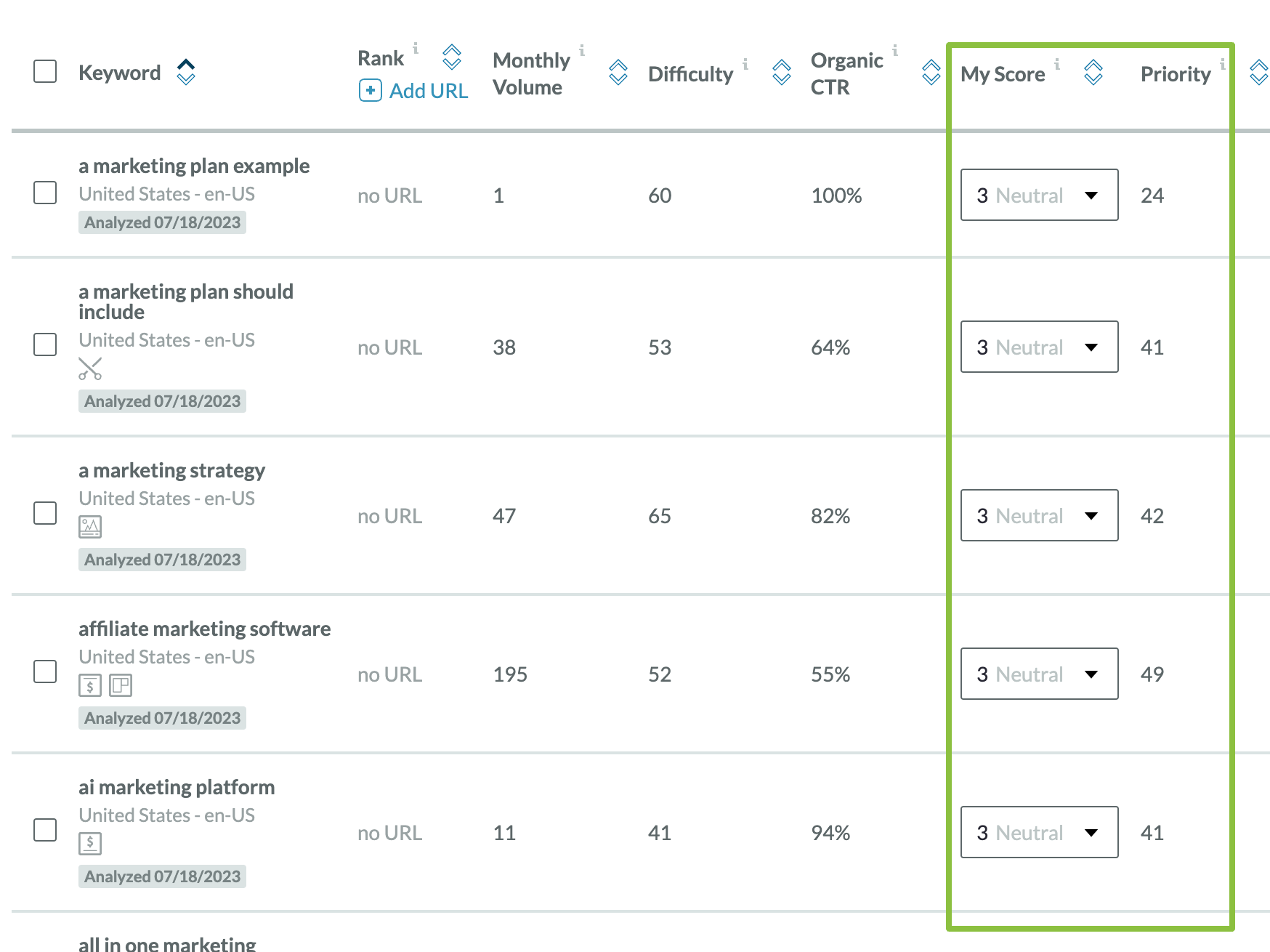
Their platform is also one of the most user-friendly and approachable tools you will find, making keyword research accessible to just about anyone. The early authority in SEO, Moz is a company of great, passionate people who have built a tool that reflects their values.
Pros
- 100% keyword match rate.
- Strong degree of keyword difficulty accuracy.
- Batch keyword uploads.
- Unique prioritization scores for easy sorting.
- Keyword CTR is a unique metric.
- Keyword list summaries.
- Keyword difficulty scores are generated dynamically.
- Good UX.
- Real-time data that refreshes often.
- Great SERP analysis features.
Cons
- Keyword ideation feels less useful than other tools.
- High price point puts them out of range for limited budget content creators and SEOs.
KWFinder – $29 monthly plan (steeply discounted to $19.90/mo for annual payment)
I’ve only been using KWFinder for a couple of years, but I’ve absolutely fallen in love with it. Initially, you may be drawn to the brilliantly simple user experience, but your appreciation will grow as you notice how it incorporates a cluster of additional features from other tools, making it one of the more humble offerings out there.
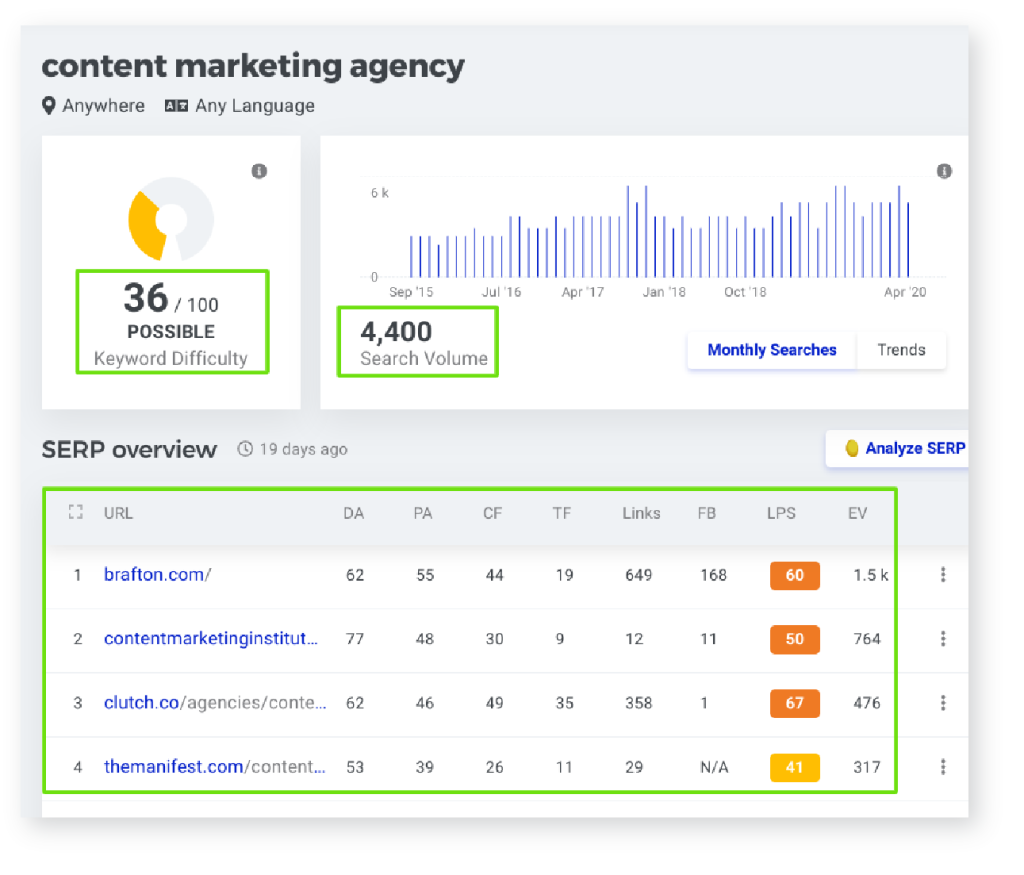
If you look carefully, you’ll see it includes a SERP analysis section with features from Moz and Majestic SEO, earning major points for consolidating data. Among many other metrics, you’ll find:
- Domain Authority.
- Page Authority.
- Citation Flow.
- Trust Flow.
It also includes an API that pulls in shares, inbound links and its own Link Profile Strength indicator.
Note that the tool also has up-to-date search volume trends and a respectable ideation section including related keywords, autocomplete keywords and questions.
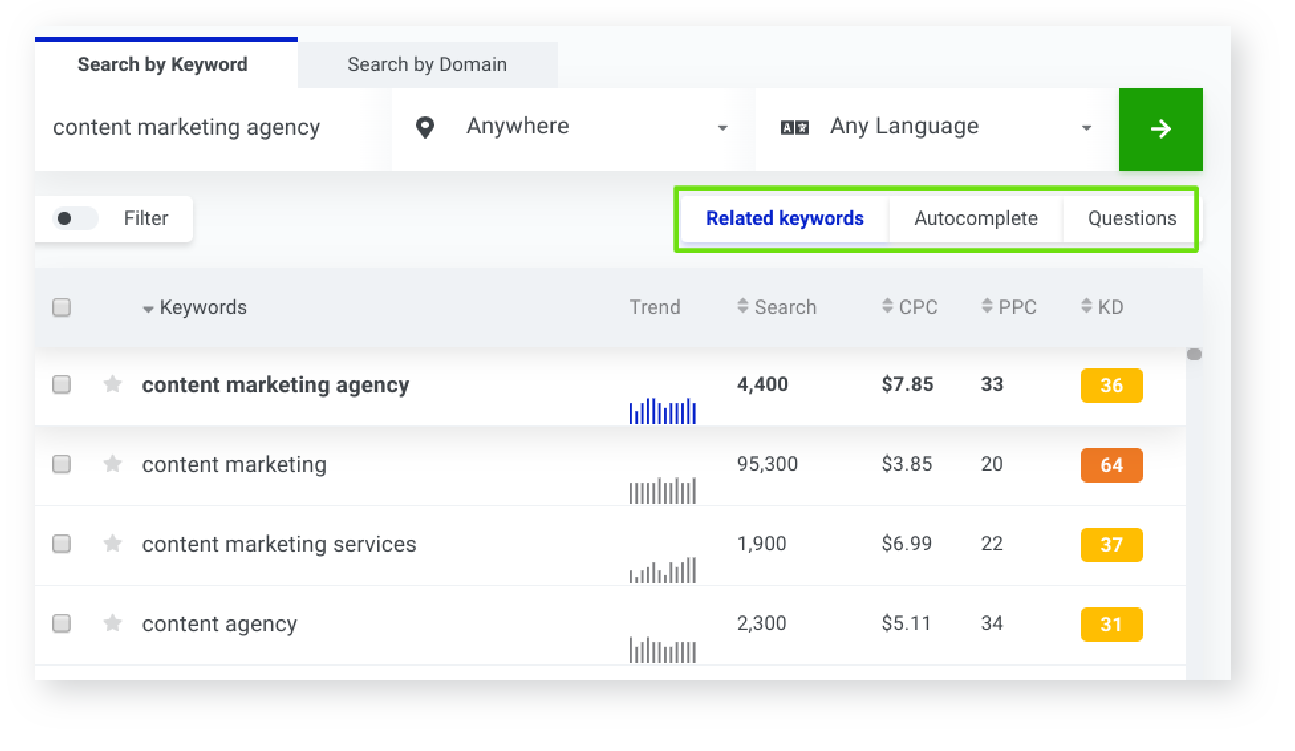
The amount of easy-to-use features, along with very accurate keyword difficulty scoring comes with a shockingly affordable price tag of $49/month (and available as low as $29.90/month if billed annually). This easily puts KWFinder at the top of the pile for value, making it my top recommendation for low-budget startups and bloggers, independent content creators and burgeoning SEO consultants. This tool is the Little Engine That Could, giving users a ton of value for very little cost.
Get this tool before they realize that they are charging about ⅓ of the yearly billing price as some of their competitors and bump the price up.
Pros
- 100% keyword match rate.
- Very accurate keyword ranking predictions.
- Batch keyword uploads.
- Pulls in metrics from external sources.
- Awesome UX.
- Affordable, highest bang-for-your-buck.
- Data is presented in a way non-SEOs can understand.
- Up-to-date trending data.
- Real-time data refresh.
- Respectable SERP analysis feature.
Cons
- One of the weaker ideation tools.
LongTailPro – $59.99 monthly plan
Big thanks to the folks at LTP for shooting me over a license so that I could demo their tool for this review.
LTP is a pure keyword research tool, offering all the main features you look for with an intuitive UX. Unlike some of the other pure keyword research tools out there, its ideation capabilities are quite strong. You could likely put together a respectable list of keywords together using only this tool.
LTP has a couple of standout features that really set it apart from the competition. All of the tools reviewed will generate a keyword difficulty score for your keyword; it’s a minimum requirement, but LTP is the only tool that will evaluate your site and tell you which keyword difficulty scores are relatively high or low for your site.

All the other tools present keyword difficulty scores without the added context of how that score applies to your actual website. LTP effectively removes the guesswork for deciding whether or not your site can rank for a keyword.
Another great feature of this keyword research tool is LTP’s SERP analysis, which generates both Page and Domain Difficulty scores for the competition ranking in SERPs.
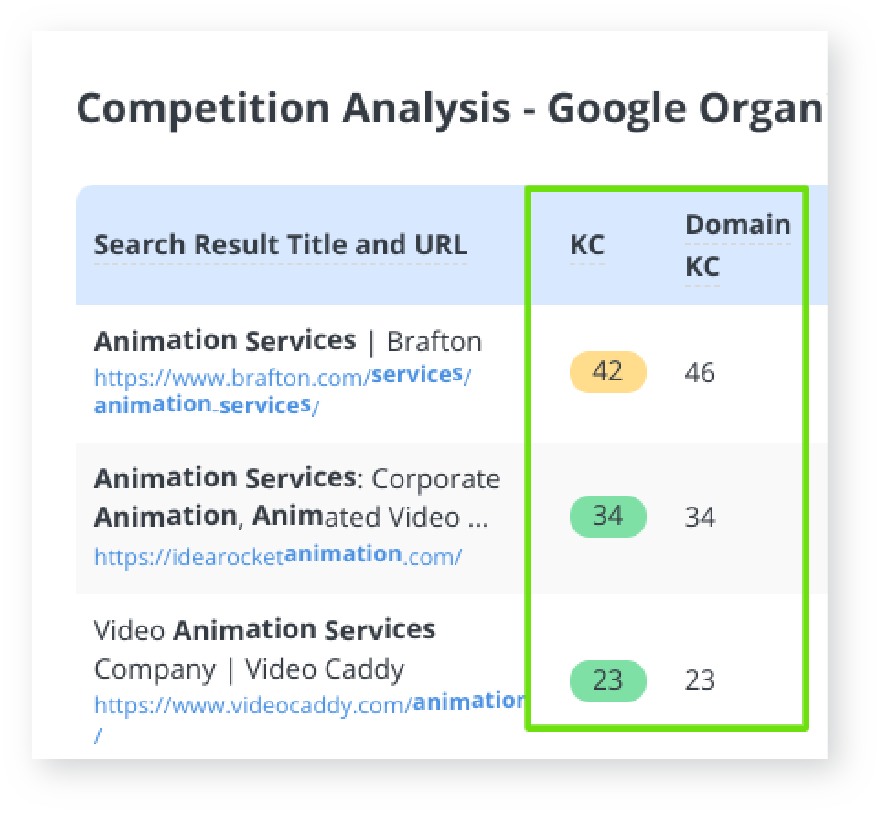
Similar to how Moz inspects SERPs for Page Authority and Domain Authority, LTP consolidates these metrics into one overarching Keyword Difficulty score. This makes quick scans through SERPs a breeze. The SERP analysis also incorporates a cluster of other metrics including Majestic Trust Flow metrics, domain age and link profiles.
Two of my other favorite features are SERP Availability and a “strongest competitor” evaluation. The SERP availability metric is yet another way to evaluate SERP crowding, but with the most user-friendly dashboard I’ve seen. LTP shows you exactly what information will be siphoning away clicks, and by how much.
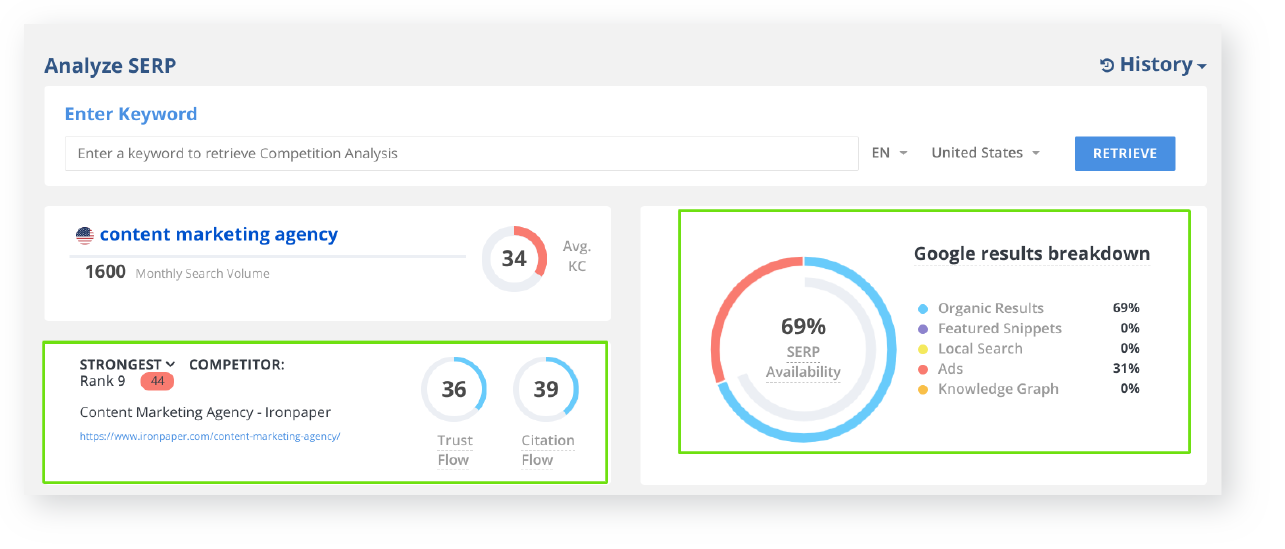
The “strongest competitor” evaluation shows you which site is going to be the most difficult to beat in SERPs.
Pros
- Relative keyword difficulty scores.
- Consistent keyword difficulty scores across keywords and competitor domains and pages.
- Batch keyword uploads.
- Pulls in metrics from external sources.
- Strong UX.
- Great SERP crowding visualization.
- Strong ideation features.
- Strongest competitor analysis feature.
- Real-time data refresh.
Cons
- Issues with kerning/text formatting in results feels a little sloppy.
- Backlink analysis is very inaccurate (at least for Brafton.com).
SpyFu – $16 monthly plan
SpyFu has some deep roots as an SEO tool, going all the way back to 2006. When I first discovered them, their main focus was delivering competitive analyses. You could plug in a competitor’s website in order to get an overview of the keywords they rank for and the keywords that overlap with your site (keywords you compete for).
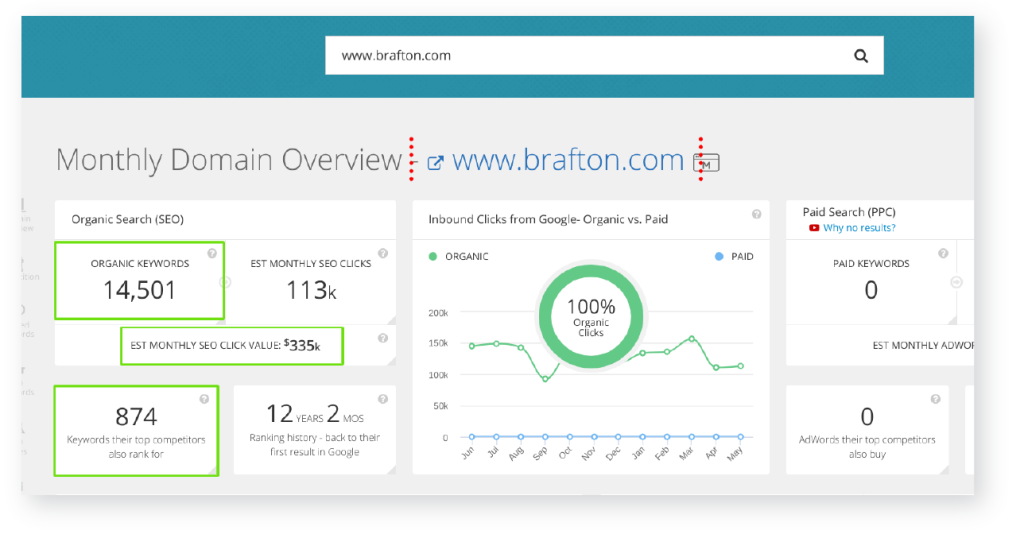
Over the years they have quietly created a full-blown SEO tool that includes plenty of keyword research features. As you can see in the price tag, their solution is the cheapest monthly option I’ve used. Similar to KWFinder, you get a lot of benefits for a little cost. In my opinion, their most impressive feature is the single keyword analysis that has an insane amount of useful data about the keyword, including estimated clicks (similar to Ahrefs’ CPS), PPC recommendations, SERP position history and a SERP overview including domain strength.
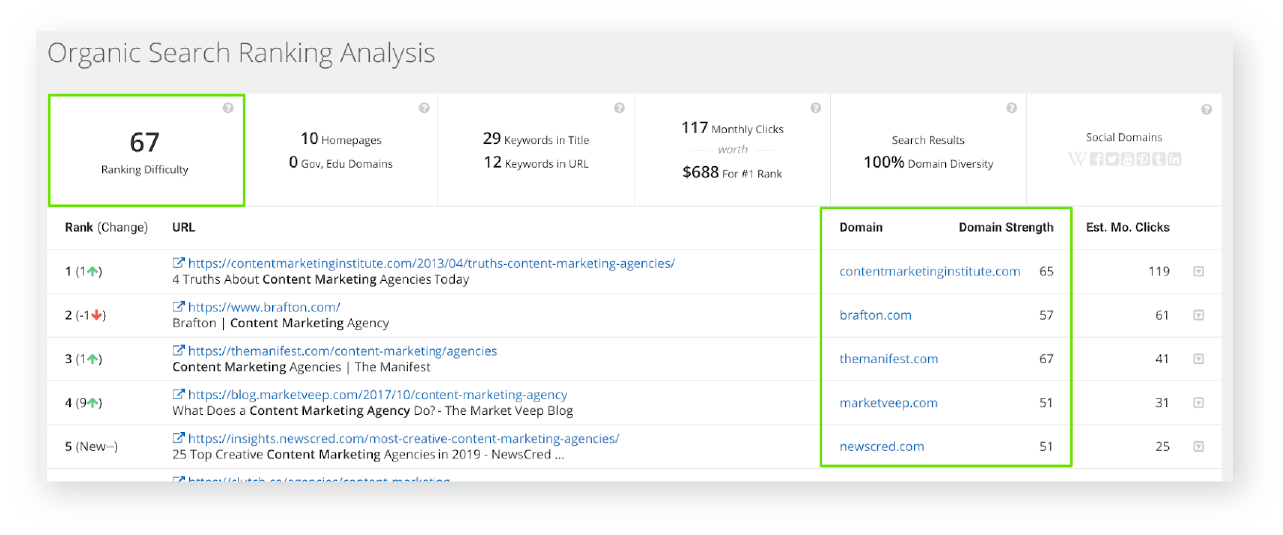
While I do appreciate the appealing price tag (particularly for SEOs and content writers looking to get their feet wet), what you save in price you give up in accuracy. And there is an added frustration that the tool’s database isn’t comprehensive enough, returning results for only 80% of the keywords I batch-uploaded. I just retested with a batch upload of 93 keywords and only got 54 matches (58%). It’s very difficult to do keyword research when your tool doesn’t have data on your keywords.
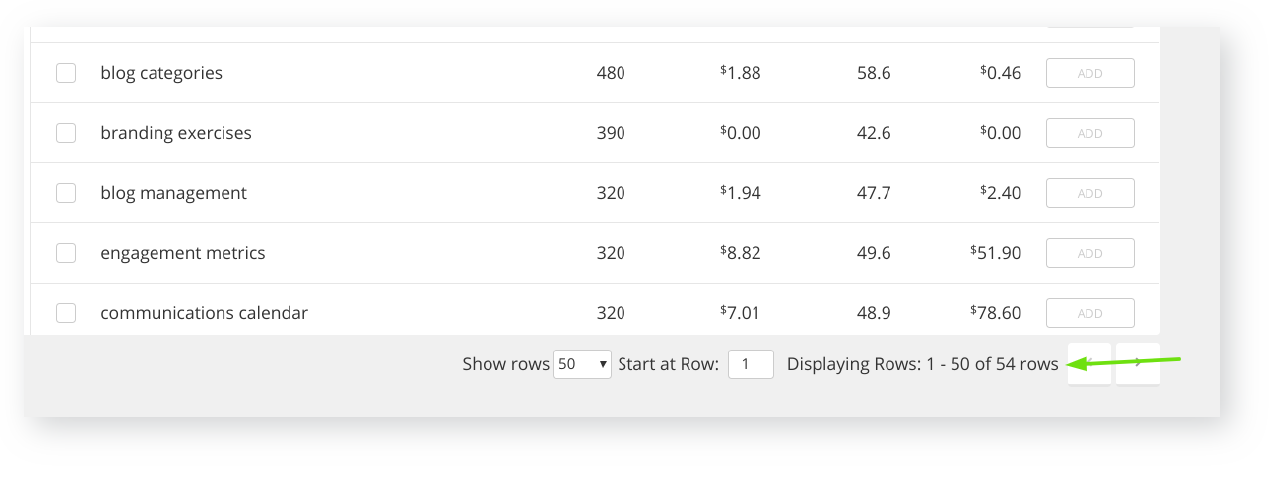
My experience with SpyFu is that it’s a nice starter tool on a budget.
Pros
- Very affordable plan.
- Excellent single keyword analysis with insightful metrics.
- Keyword “grouping” into content types is a useful list feature.
- Batch upload functionality.
- Easy to navigate and understand.
- Also includes access to many SEO analysis features.
Cons
- Questionable keyword difficulty accuracy.
- Low match rate on batch uploads.
- Data isn’t refreshed in real-time, nor is there an option to do so.
Semrush – $129.95 minimum monthly plan
Semrush has come a long way over the past couple years with their keyword research capabilities, putting them in the upper tier of tools.
I was previously frustrated with Semrush’s inability to easily batch-upload large sets of keywords in order to quickly generate and export search volume and difficulty scores. Getting the information I needed was less straightforward than other tools, requiring me to grab some information from one part of their keyword research tool, and grabbing the missing information from another part of the tool. And vice versa. Part of the problem, unlike the other keyword research tools on this list, is that they have yet to seamlessly integrate all of their keyword research functionality into one intuitive section.
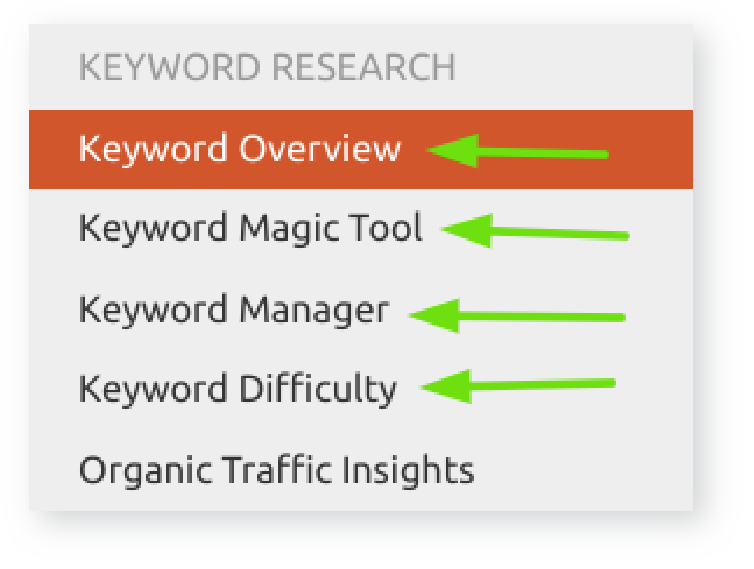
That said, they’ve made great strides in this area with the Keyword Overview section, which allows you to batch upload a maximum of 100 keywords. The output is more intuitive, has a high match rate and lets me easily export a .CSV file.

As an added bonus, Semrush does a great job with its SERP analysis of individual keywords, providing comparable data to Ahrefs:
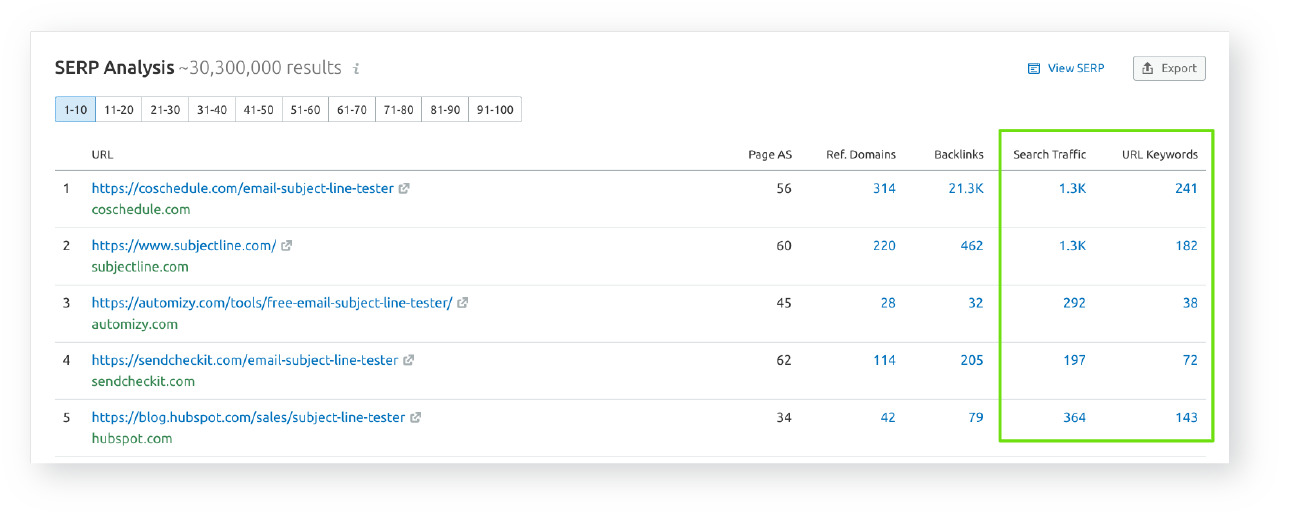
In recent years, Semrush has done such a great job catching up with — and passing some of their competition — that they have earned a well-deserved place on this list.
Pros
- Excellent single keyword analysis with insightful metrics.
- Keyword “grouping” into content types is a useful list feature.
- Batch upload functionality.
- Easy to navigate and understand, good UX.
- Also includes access to many SEO analysis features.
- Respectable keyword difficulty accuracy.
Cons
- Consolidating keyword tools into one section would be ideal.
- Max of 100 keyword uploads means you’ll likely need to do multiple batches.
Paid Tool Conclusion
While no single SEO tool is completely accurate when reporting monthly search volume and keyword difficulty, using any of these tools will get you worlds closer to making informed decisions about what keywords are the right keywords for your specific website rather than not using one at all. When selecting one of these tools, the real decision comes down to budget. When making your decision on what paid SEO tool to implement into your technology stack, it’s best to look at your company’s unique needs and base your choice on which tool will help you meet those the best.
So, no, there’s not just one right answer when it comes to the best keyword research technology, but there are tons of amazing choices to use.
If you’re working for an organization that will be doing a substantial amount of keyword research on a monthly basis, you may want to consider a higher-powered tool like Ahrefs, Moz or Semrush. If you’re a content creator or single person organization looking for something budget-friendly but without all the bells and whistles, you can get by just fine with LTP, KWFinder or SpyFu.
Now it’s time to put that data to use.
Step 6:
Prioritize Your Keyword Options Based on Potential
Status check: At this point of the keyword research process, you have a large list of keywords that you’ve uploaded into your keyword research tool. Our next step is to export all of our data into a spreadsheet and find the highest potential keywords.
Step 1: Export Your Data Into a .CSV File
Each of the tools listed above allows you to export the full set of keywords you imported along with each keyword’s metrics. Export the .CSV.
Step 2: Create a Spreadsheet
Any spreadsheet tool you like to use to organize data is perfectly fine, whether it’s Google Sheets, Apple Numbers or Microsoft Excel. As long as the tool has sorting and conditional formatting options, you are good to go.
You’ll want to ensure that you have a minimum of the following columns:
A. Keyword – you’ll be entering the actual keyword being evaluated.
B. Intent Type – In the next chapter, you will be determining if the keyword type is informational, commercial or navigational.
C. Content Type – In the next chapter you will also be determining the type of content that should be written for the keyword.
D. Search Volume – Enter this data directly from your .CSV export.
E. Difficulty – Same as above, enter this data directly from your .CSV export.
F. SERP Data – If you’re using Ahrefs or Moz, enter the CPS (clicks per search) data or Organic CTR data. If you’re using neither, leave blank.
Your empty spreadsheet should look something like this:

Use conditional formatting for each of the search volume, difficulty and CPS/Organic CTR columns. You’ll want higher search volume and CPS/Organic CTR metrics to appear green, and lower numbers to appear red. Do the opposite process that you used to find keyword difficulty, with lower numbers being green and higher numbers being red.
Step 3: Enter Your Data
Copy/paste the data from your .CSV file into the spreadsheet. If you’ve set up your conditional formatting properly, your spreadsheet will start looking pretty colorful.

Bonus Step: Keyword search volume is rarely an accurate indicator of the amount of search traffic a page will drive if you create a blog or landing page targeting it. Pages generally rank for many related keywords, each driving traffic to the same page depending on the keyword’s search volume and your page’s ranking position.
Try using the tool, Ahrefs to get a better feel for actual search traffic potential.
Here’s how: We can see that the keyword “content marketing agency” is searched 4,000 times per month in the U.S.
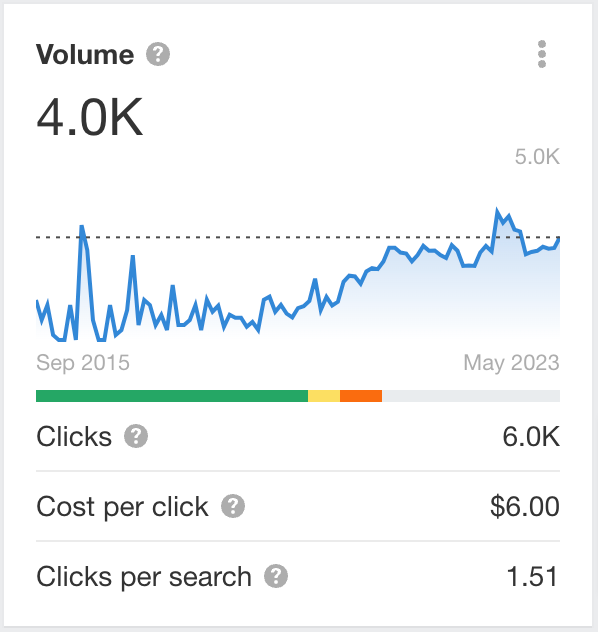
But the pages that rank in the top-10 results for “content marketing agency” rank for an average of 267 total keywords. Furthermore, those keywords drive an average of 1,290 visitors per month.
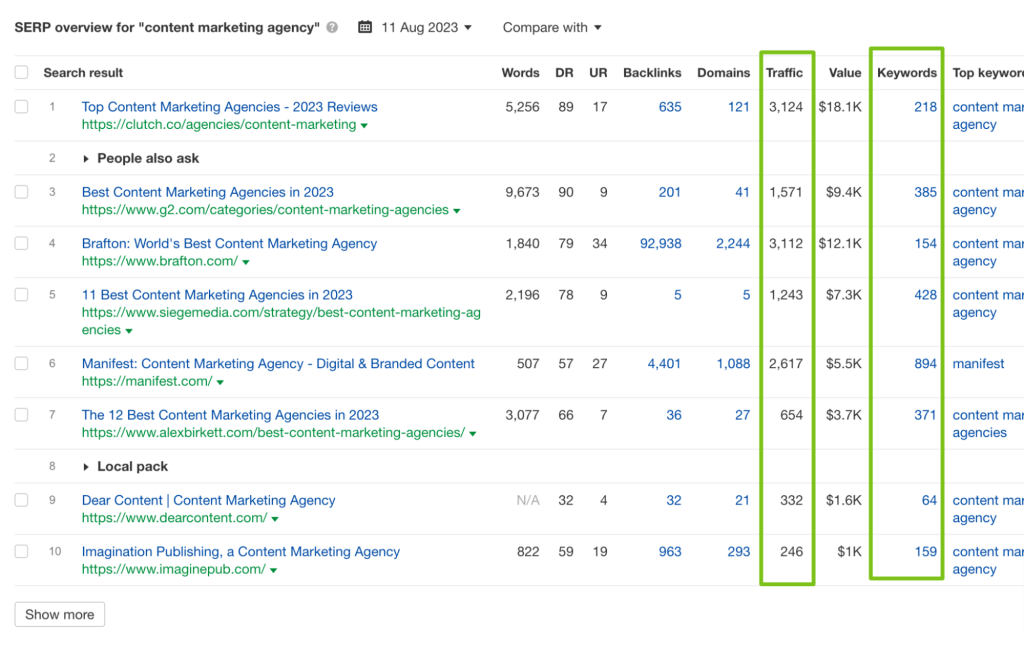
So if we look at this from the perspective of “how much traffic can this topic drive?” – rather than “How much traffic can this single keyword drive?” – your forecasting will be much more accurate. As a matter of fact, using Ahrefs to backtest this theory on our existing landing pages yielded 80-85% real-life traffic accuracy. 80-85% accurate traffic forecasting without writing a single word is an SEO’s dream scenario.
This is a manual process and, if you have the time to do it, I highly recommend the investment. Add another column to your spreadsheet and add this data.
Step 4: Find the Best Combination of Metrics
We are looking for keywords with the best combination of high search volume, low difficulty and (optional) strong SERP data. I usually start this process by eliminating keywords that I’m positive I won’t be targeting. You can use your inductive reasoning skills for this, on top of the previous research into what keywords have been the most common or appear the most helpful in potential results.
I’ll immediately disqualify keywords with zero search volume by marking the cells red. I’d recommend not deleting the keywords because if you revisit this list in the future you’ll want to know the keywords you’ve already eliminated. You’ve already done the research into what the right keywords are, and found which keywords don’t work — this can save you tons of time if or when you need to complete this process again in the future.

I’ll then disqualify keywords with disproportionately high keyword difficulty scores. As discussed previously, I know we don’t generally rank on Page 1 for keywords with Moz difficulty scores above 35, so I’ll eliminate all of those right off the bat.
Now that you have a more manageable list, you can start scanning for keywords that have strong metrics and a high level of relevance to your brand. As I go along, I’ll generally highlight my favorite keywords light blue.

Once you finish, you should be left with at least a few interesting keywords that you want to further qualify in the next step. We should be left with only high-potential keywords that our tool(s) indicate we can a) rank somewhere meaningful and b) have sufficient search volume to justify investing in content creation. This process can give you confidence that you will find results with each of the words that you select, making it easier for you to put time and energy into content creation because you know that it will be worth it.
Now that we have a shortlist, we’ll need to add a human element to the qualification process.
Step 7:
Analyze the SERP and Designate Content
We’re 90% of the way to the finish line. Congratulations on making it this far! At this point of the exercise, we’re now left with only relevant keywords, each with substantial search volume and plenty of ranking potential.
But without this next step, everything we’ve done will fall flat on its face.
We need to manually inspect SERPs for each potential keyword, then designate how we’re going to use each keyword (if we decide to use it).
Tip: Keyword difficulty scores can send false positives or false negatives. Imagine seeing data like the following for your target keyword:
- Target keyword: “best DIY projects”
- Search volume: 500
- Keyword Difficulty: 32 (easy)
Looks great, right? Well, not necessarily. Keyword difficulty scores are averages and don’t give very much context around the data. What if the ranked results look like the following:
- Position 1: Domain Authority 99, Page Authority 76.
- Position 2: Domain Authority 92, Page Authority 67.
- Position 3: Domain Authority 89, Page Authority 71.
- Position 4: Domain Authority 23, Page Authority 22.
- Position 5: Domain Authority 17, Page Authority 19.
- Position 6: Domain Authority 21, Page Authority 23.
- Position 7: Domain Authority 27, Page Authority 9.
- Position 8: Domain Authority 12, Page Authority 3.
While the keyword difficulty score reported to you is technically accurate, it reads as a bit of a false positive because you’ll likely rank no better than position 4, which is respectable, but there is a big difference between a CTR of 32.5% and 6%.
The above scenario happens frequently and can drastically influence whether or not you decide to target a keyword. You can save yourself a lot of time (and heartbreak) by plugging the keywords into SERPs and deciding if the results are actually delivering positive outcomes.
Step 1: Manually Investigate SERPs for True Difficulty
Let’s revisit the keyword difficulty section of this guide. Any of the paid tools you’ve chosen calculate average keyword difficulty scores by evaluating the actual pages – and their domains – that rank on the first page of results for a keyword. But you need to keep in mind that keyword difficulty scores are just a best guess by that tool.
There is no replacement for manually inspecting results with your own eyeballs. Not only will this give you a higher degree of accuracy, but it can give you insight into where your landing page will likely rank.
When you’ve managed to narrow your larger list down to a small number of top candidates, manually look through the results and use your common sense. Are you trying to outrank Amazon, Wikipedia and Forbes for the top 3 positions?
Probably not.
Add metrics to your investigation by using the SERP inspection tools available in your paid tools, reviewed previously.
Step 2: Investigate SERPs for Intent and Content Matching
Google is an incredible sorting mechanism, rearranging the types of content searchers are interested in clicking on when they search for something. Typically, searches can be broken down into three main categories: informational, commercial/transactional and navigational (we touched on this subject early on in the guide).
We are going to talk about matching informational and commercial types of keywords to appropriate types of content.
Informational
About 80% of all searches are informational, meaning searchers are typically seeking more information about a particular subject matter or topic. These people are not intending to buy anything, just glean knowledge from the sources available to them. Typical content that results from informational searches:
- Blogs.
- Guides.
- Resource pages.
Google is constantly evaluating how people are interacting in search results for keywords and rearranging the results based on how searchers vote with their clicks. Google is striving to match informational searches with content that best provides the information the person is looking for, which typically means blogs and guides.
Commercial/Transactional
10% of searches are commercial/transactional, meaning searchers are shopping for products or services. These people are likely to intend to buy or request more information on any sort of product or service. Typical content that results from commercial/transactional searches:
- Product landing pages.
- Homepages.
- E-commerce sites.
Similarly to informational searches, Google also strives to match commercial searches with content that makes it easy for searchers to review a product or service and purchase or request a demonstration, usually a product or service landing page.
Hypothetical “Mixed-Intent” Example
Searching “best project management software” results in 5 blog posts comparing the best project management tools, and 5 product landing pages from companies that provide project management software.
If Google sees that 99% of all clicks are going to the blog articles, the search engine will determine that this is the type of content searchers most likely want to read, and may shuffle and deliver those types of results to the higher positions and move the content that does not satisfy that intent toward the bottom of the page. Essentially, if your landing page or blog are constantly clicked on, Google will catch on and bring that page up whenever someone is looking for the service, product or information that you’re offering your audience.
If the content you create doesn’t match the intent of the searcher, it doesn’t matter how strong your Domain Authority and Page Authority are; you’ll never survive in the top results.
You need to ensure that you write the type of content that your target audience wants to read. So by looking through Google’s search results and paying attention to your deliberate and strategic research, you will see a constantly self-correcting mechanism of the types of content searchers “voted” for with their clicks.
Investigate the SERPs for each keyword and determine whether your target keyword is informational, commercial or a mix of both.
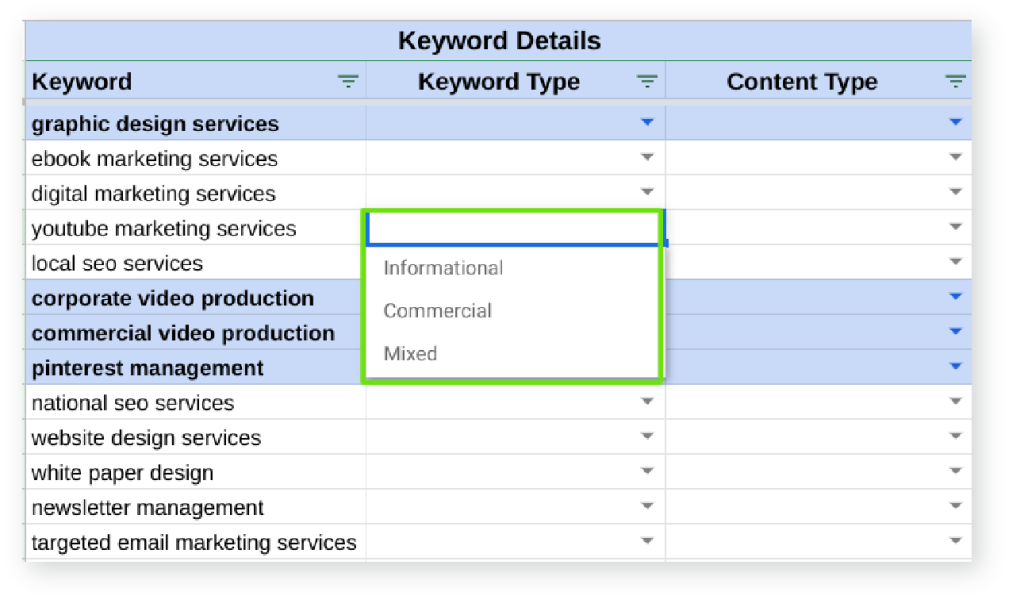
Step 3: Designate How You’re Going to Use the Keyword
The next step is a natural extension of the previous step. Taking this list and simply “using these keywords throughout your site” is a complete waste of time and will accomplish nothing. You need to determine exactly how you’re going to use each keyword. This part of the keyword research process is all about strategy. Writers can’t just stuff keywords in the content in the hopes that the search engine will rank the content. You have to plan where your keywords will work best within the content both for readability and optimization of the piece. Based on the results from the previous step, this should be fairly easy.
Go through your top keywords and choose the type of content you will want to create for each keyword.
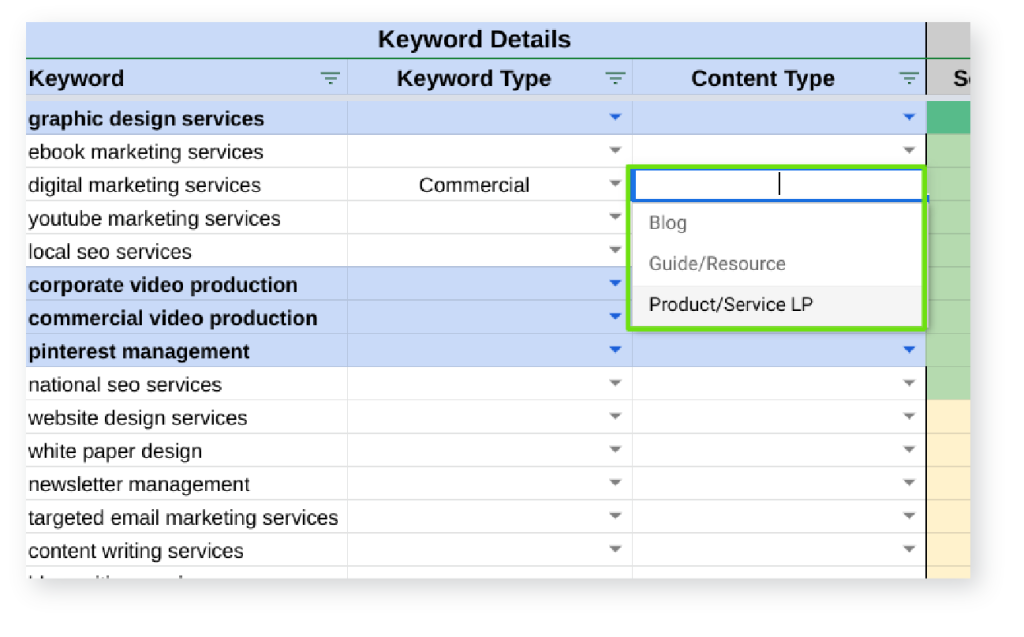
Bonus Step: Consider how you will write the content for your target keyword. If you noticed SERPs contain lots of results with list blogs, you should strongly consider doing something similar. If you noticed most results use a heavy amount of graphics in their content, it’s possible that searchers are looking for just that.
At this point, you should be left with a shortlist of all the keywords you want to go with. You’re ready to start writing!
Step 8:
Write The Content
Google has come a very long way with understanding how well content satisfies the intent of a keyword. It also understands how thoroughly you covered all subtopics the searcher might want to know about. This further underscores the significance of selecting the right keywords when creating content – specifically, by making sure you truly know the intent behind the queries you’re targeting with that content.
However, Google’s evolution is a predominantly positive development for content creators, because it gives them an opportunity to “punch above their weight class” when targeting keywords.
For instance, in the olden days of SEO, Google primarily relied on link profiles for pages and domains along with on-page SEO factors to determine what should get prime positioning in search results. In other words, high-reputation websites could win keywords on the backs of their reputation alone, rather than the quality of their content.
Google was more mechanical back then — it relied on link data and the things you said the page was about via on-page metadata rather than the content that was actually presented on your webpage.
While Google still uses these indicators to a point, it is now more likely to award prime placement to the highest quality content rather than just going with the most reputable site. This is great news for you, because it allows your hard work to be recognized and delivered to people on Page 1. So what that means for us is that we can often beat powerhouse websites if we create better content that truly satisfies searcher intent.
Writing for Depth of Topic Coverage
I’ve spoken about this at length, shown live examples of how this works in real-time, and shown how you can add depth to existing pieces to gain better rankings.
With all of the information that was just given to you, this is the gist of it: If you want to write a piece of content on a topic, you should find out what all of the supporting topics are that you could cover to make the piece more thorough. Become the subject expert when doing your research, so consumers can come to you with complete confidence and trust. Ideally, you don’t want to give the searcher any reason to find more information from another website. You want to be the Wikipedia for that subject matter.
You can get this information manually, or by using a high-powered tool like MarketMuse, or a writer-friendly tool like Clearscope. These tools will show you how well you covered all the potential sub-topics searchers are looking for and what areas you may need to improve in.
MarketMuse
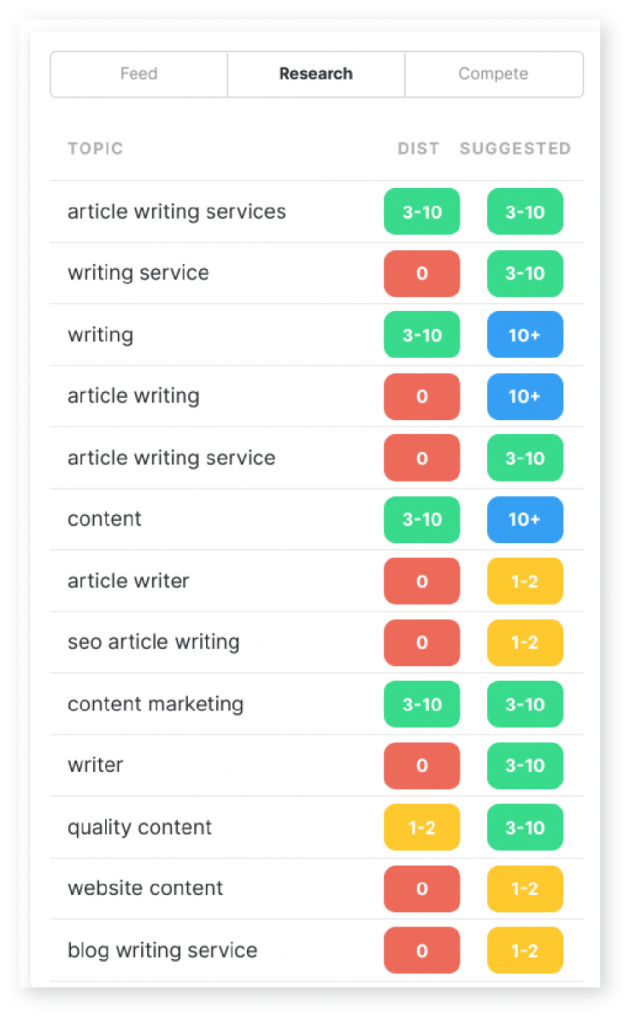
Clearscope
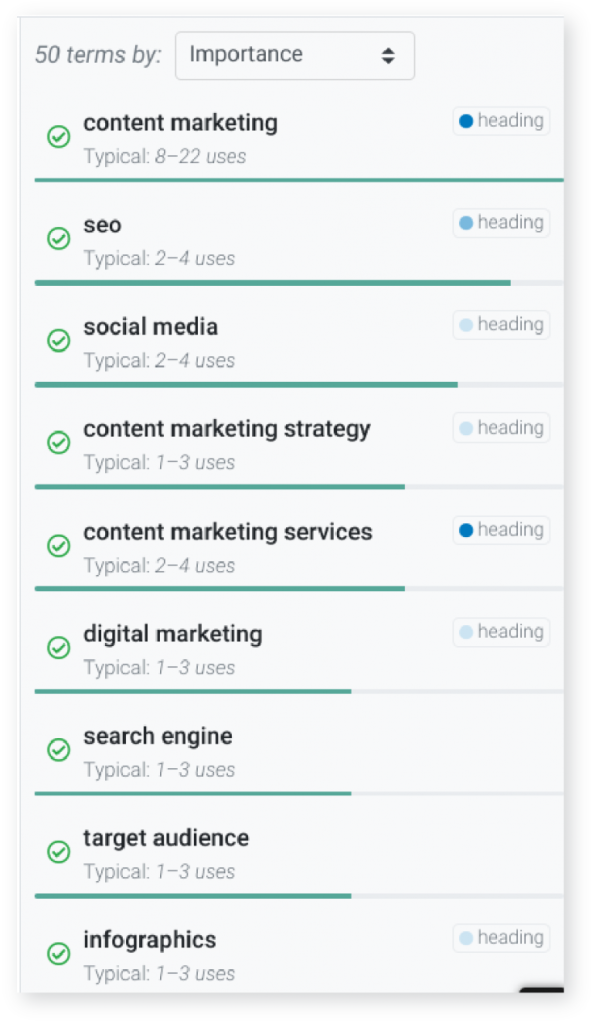
se these tools to create an intuitive content brief that you can hand to a writer who can then create the most thorough piece of content on the web for that topic. Once your content is published and indexed, expect it to take 100-150 days to start generating results. Even with all of the research, time and energy that you’ve put into your website, it still takes time for that content to be recognized and distributed.
Conclusion
It’s a lot of work, right? Keyword research definitely is a science of a thousand details, but it’s what you need to do to be successful and exactly why it needs to be taken seriously.
And once your content is published, you’re still not done.
You need to evaluate your content in search visibility reports in Google Search Console and look for opportunities to re-optimize content. Focus on:
- The queries your page ranks for.
- Average ranking position for keywords.
- Impressions.
- Click-through-rates.
If the page is underperforming (ranking poorly for target keywords and/or driving very little traffic), you may have to try another target or re-check your on-page optimization.
If the page is performing, now you have a whole new project to start: evaluating whether or not the page is effectively converting visitors and contributing real commercial value (but let’s save that for another day).
Ready to level up your website game and create optimal digital content? Let’s work together!
The Content Marketer
Get the latest content marketing updates delivered directly to your inbox with our weekly newsletter.







